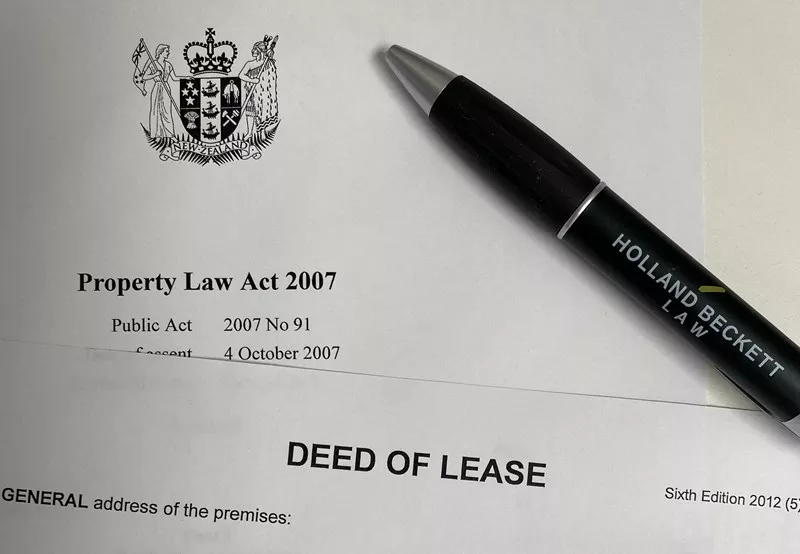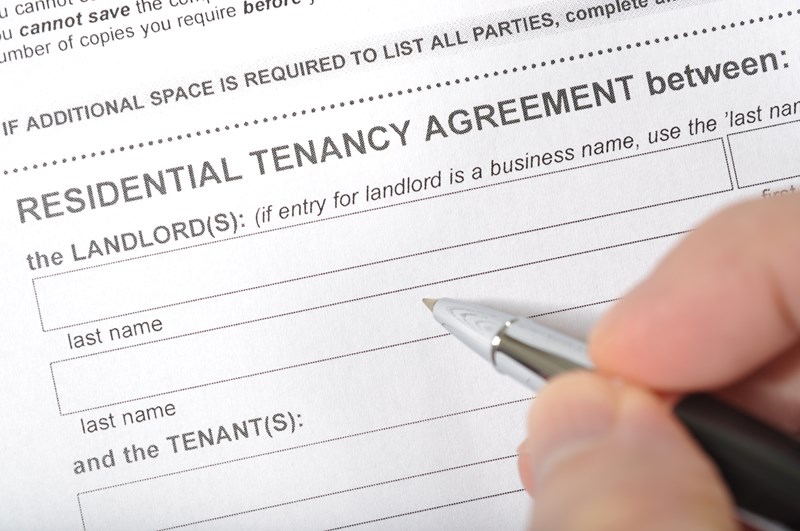Property Law
Whether buying, selling, leasing, subdividing, building or renting, our experienced team of property specialists will help you get the most out of your property investment.

Holland Beckett offers comprehensive property law and conveyancing advice to clients, from first home buyers to developers, to farm and orchard owners, to commercial property and retail investors.
Our specialist property teams will help you to navigate increasingly complex regulatory requirements, working closely with the environment and planning team when required to provide a complete solution to any real estate challenge.
Our Experience Includes:
- Sale and purchase agreements
- Residential tenancies
- Building contracts
- Unit titles and cross leases
- Bank lending and mortgages
- Residential subdivision and section purchases
- Buying and selling of commercial and industrial land
- Commercial lease drafting and negotiation
- Sub-leases
- Rent review disputes and mediation
- Overseas Investment Office consent applications
- Commercial and industrial subdivisions
Our Property Law Team
Related News & Resources

Room to Grow – The Future Is Infill
As New Zealand’s towns and cities grow and land becomes scarce, infill housing is an obvious solution to meet demand. Infill development encourages vibrant and inclusive communities by offering a range of housing choices, like duplexes, townhouses or apartments, close to existing amenities and public transport. It makes use of established infrastructure, helping to maintain and upgrade facilities, strengthening the neighbourhoods already in place.
However, thoughtful design is key. New developments need to respect the look and feel of the area, be well connected and include private and shared outdoor spaces. Safety and privacy can be provided with smart layouts, noise control and good lighting. The consenting processes across the country all emphasise these principles, and planning rules are increasingly focused on ensuring new homes contribute positively to the surrounding environment.
Ownership structure also matters when planning an infill project. There is often a strong preference for freehold titles because they provide a high degree of control and work well for standalone homes with private yards and driveways. Unit titles (or strata ownership) are commonly used for higher-density developments with shared spaces. However, either option can be made to work well in an infill context - it depends on the site, the design and the target market.
Beyond design and ownership, the long-term success and value of infill housing developments often comes down to the legal frameworks established during the development process. These include land covenants, body corporate rules and residents’ societies, which govern how shared spaces are managed and how people live alongside one another. Well-drafted rules help prevent disputes, ensure maintenance is carried out and support a sense of community.
Legislation has a key role to play in making better use of land for housing. In many areas, old land covenants (private rules between property owners, separate from council planning) are quietly stopping development. Removing these covenants is expensive and unpredictable. Either every affected owner has to agree (which is rarely practical), or you have to go to court and prove the covenant no longer makes sense.
Policymakers need to consider a better way forward, such as imposing a time limit on covenants, or flipping the current legal process on its head: instead of proving a covenant is outdated, those who benefit from it would need to show that the covenants still serve the neighbourhood meaningfully. Doing so could unlock a surprising amount of land for new housing without putting genuine neighbourhood protections at risk.
Done well, infill housing offers a practical, affordable and sustainable way to meet New Zealand’s housing needs. Whether you’re a homeowner with a large backyard or a landowner with a subdividable site, infill housing could be a smart way to unlock value. With expert legal and planning advice, and the right structure and support, you could turn unused space into valuable housing - and help your hometown grow responsibly.
Thinking about developing your property? Hilary Anderson is a Partner at Holland Beckett, specialising in urban development and infill housing.
This article was first published in the New Zealand Herald and Bay of Plenty Times, October 2025.

Fee Simple or Cross Lease titles – Key differences and the process for converting
If you own land or are considering purchasing it, understanding the type of ownership is essential.
Different estates come with unique characteristics that can affect how you use and manage the property. In New Zealand, there are several different land estates, each with its own advantages and disadvantages. Two common forms are fee simple (also known as freehold) and cross lease.
Fee Simple (Freehold)
Fee simple land is generally the simplest form of property estate in New Zealand. Owning a fee simple title means you have complete ownership of the land. This gives you flexibility to build or make changes without needing consent from other owners, unlike cross lease arrangements. However, your property is still subject to council regulations and any registered interests on the title, such as easements or land covenants, which may affect what you can do. Fee simple titles are often viewed more favourable to prospective purchasers when selling your property because they offer full ownership, autonomy, and no lease expiry dates and thereby potentially increasing the market appeal and value of the property.
Cross Lease
Cross leases are a type of title which were favoured in the 1960s by developers as a means to complete a subdivision in a flexible, expedient and less costly manner when compared to fee simple subdivisions. Cross leases are made up of two components. Firstly, the parties to the cross lease all own an undivided share of the underlying land and secondly, a lease for party of the land/building. Each owner of the land may then erect a building on their allocated area/segment of the land. This building will then be leased back to them (often for a term of 999 years) and recorded on the record of title.
The lease sets out the rights and responsibilities of each party sharing an undivided share of the underlying land, including a right of exclusive use and enjoyment for each building and usually the yard associated with that building.
Restrictions of Cross Lease Titles
Generally the lease contains rights and restrictions on what you can and cannot do on your property. The more significant restriction being the requirement to obtain your cross lease owners consent to any additions or alterations on the land and to any dwelling(s) on the property.
If consent of the other cross lease owner(s) is granted, you will also need to update the deposited plan / flats plan shown on record of title in order to accurately reflect the dwellings located on the underlying land which can be costly. If consent is not obtained or the flats plan is not updated or obtained prior to carrying out such works on your property, this may result in a dispute between owners or a defective title. This can affect the future on-sale of the property as under the latest ADLS Agreement for Sale and Purchase of Real Estate, a prospective purchaser may request that a new flats plan is deposited or you obtain consent from your neighbours for any unauthorised structures prior to settlement.
Benefits of Fee Simple Titles
While there are some advantages to maintaining cross leases, including having an element of control over what your neighbour / cross lease owner can and cannot do on their property, it may be beneficial to convert your cross lease title to a fee simple title. Full ownership then gives you the freedom to build, renovate and make changes without requiring consent from other owners.
Converting Cross Lease to Fee Simple
The first step is to discuss with your neighbouring cross lease owners to see if they are interested in converting to fee simple. If all parties are interested, then converting your cross lease involves the following:
Engaging a surveyor who will assess the underlying land as to the services and access to the dwellings. This stage may also include an assessment on whether separate services for sewage, water or drainage are required.
A Resource Consent would then need to be applied for from local council. Depending upon the property and area, council may impose conditions and works needing to be undertaken prior to granting consent.
Once consent is granted your surveyor will provide the plan to your solicitor. Your solicitor will then use it to draft the relevant documents to complete the cross lease conversion, including obtaining mortgagee consent (if applicable), drafting easements, covenants and preparing all ancillary documents necessary.
Once both your surveyor and solicitor have worked together to prepare the relevant documents and obtained the necessary consents, the documents and plans are lodged with Land Information New Zealand for separate fee simple titles to be issued for you and your neighbour.
Holland Beckett has a large, experienced property law team who have assisted many clients in converting to fee simple titles. If you would like any assistance with converting your cross lease, please get in contact with one of our property team.

Changes to the Public Works Act – additional compensation on the table for landowners
The Government recently introduced changes to the Public Works Act 1981 which provide for additional compensation for landowners who have their land acquired by agreement for certain projects. These projects are generally roading projects, based on those listed in the Fast-track Approvals Act 2024 or are identified as Roads of National Significance.
This will be of particular interest to local landowners who have land that will be used by NZTA for the Takitumu Northern Link - Stage 2 as this project is subject to the new compensation provisions and negotiations are already underway with landowners.
The Public Works (Critical Infrastructure) Amendment Act 2025 was passed on 26 August 2025 and is designed to speed up the land acquisition process for critical projects where a designation is in place or applied, or a resource consent is obtained. The new provisions involve:
Additional compensation as an incentive for landowners to reach agreement on land acquisition, being:
Recognition payment: 5% of total land value up to a maximum of $92,000 to recognise the land is being taken for critical infrastructure;
Incentive payment: 15% of the total value up to a maximum of $150,000 if the landowner reaches an agreement before the Minister or local authority serves a s 23 PWA notice (being the process to compulsorily acquire the land).
The landowner must give vacant possession in order to receive the additional compensation. The vacant possession date is by agreement, or within one month of the Minister or local authority giving notice that vacant possession is required.
Removal of the right of objection to the Environment Court for land that is taken for projects designated as critical infrastructure. Instead, a submission process is available where a landowner can make a submission to the Minister or local authority, with an opportunity to make a second submission following the Minister or local authority’s comments. The ability to object to the valuation tribunal for compensation remains.
These provision also apply for critical infrastructure projects where negotiations are already underway. There are exceptions for Māori land and an ability for agencies to opt-out of the above process and use the standard PWA process.
The key benefit of these changes is that landowners who are willing parties to land acquisition are able to obtain additional compensation (up to $242,000 depending on land value) if they reach early agreement with the Minister or local authority before it issues a s 23 PWA notice for compulsory acquisition.
It is therefore important to approach negotiations for land acquisition for such projects with these timeframes in mind to avoid inadvertently missing out on increased compensation.
There are further reforms expected to the PWA this year, including the requirement for compulsory mediation for compensation disputes, but these are not yet in force.
If you have any questions on the Public Works Act 1981 or this article, please contact our public works specialists: Bridget Bailey, Natasha van der Wal and Hilary Anderson.

Refinancing – things to consider before switching banks
With interest rates beginning to drop now might be a good time to consider replacing your current financial provider.
When you refinance you are taking out a new loan and using this to repay your existing loan. Here’s a rundown of key factors to keep in mind before making the switch:
Lawyers
Most banks will require you to have a lawyer to help you through this process. They will liaise with your current bank advising them of your intent to refinance, advise you on your new loan contract, receive your new loan funds and use those funds to repay your current loan. They will also ensure the existing mortgage (i.e. the instrument registered on your property’s title) is properly discharged and register the new mortgage on your property’s title. They also advise on any legal risks or obligations associated with the refinance. It is important to involve your lawyer at the start of the refinancing process so that they can ensure that everything runs smoothly.
Compare rates and consider break fees
Look at the interest rates offered by the new bank versus your current one. Take into account break fees - if you are refinancing during a fixed term under your current mortgage you may be liable to pay break fees. Break fees, also known as early repayment charges, are penalties that lenders charge borrowers when they repay a fixed-rate mortgage early or refinance to a new lender before the end of the borrower’s fixed interest rate term. You should get in touch with your current bank to see how much these may be. It is important that you have borrowed sufficient funds to repay all lending as well as any break fees.
Cash contribution
You should negotiate a cash contribution or a cash back. This is a special incentive that banks offer for switching to them and is essentially a reward or bonus for choosing them, the idea being that it often reduces your out-of-pocket-expenses. Most banks will offer a lump-sum payment of 0.8% - 0.9% of your total lending which is paid directly to your bank account after settlement. You generally do not have to pay back the cash contribution as long as you meet the terms and conditions of the loan offer, like keeping the account open for a certain period of time, typically a minimum of 3 years. However, if, for example, you refinance to another bank within that period you will most likely need to repay the cash contribution on a pro rata basis.
Insurance
Your new lender will need to be noted on your insurance certificate. Some banks also have specific requirements around insurance, so it is important that you check with your insurance company that your current policy is sufficient.
Security
Your lawyer will need to know if there are any existing guarantees or other securities which will need to be released and or discharged with your current bank. Banks do not automatically release these or bring them to your attention once lending has been repaid. If your new lending involves a company or a trust additional legal advice may be required.

Residential Care Subsidies
If you are approaching or have already reached 65 years and think you may require long-term residential care, did you know you may be entitled to a residential care subsidy?
What is the average cost of residential care in NZ per annum?
This annual cost of residential care varies based on a range of factors such as location, level of care and accommodation type.
Health New Zealand – Te Whatu Ora sets a maximum contribution for reach region, being the highest amount a resident can be charged for standard care.
Currently in Tauranga the maximum contribution is approximately $1,294.86 per week.
What is a Residential Care Subsidy (“RCS”)?
A RCS covers the difference between the actual cost of care and the applicant’s assessed contribution towards the care costs.
The RCS is paid directly to the care facility by Health New Zealand – Te Whatu Ora.
The subsidy covers the cost of standard residential care costs only, such as accommodation in a standard room, daily living assistance, nursing, prescribed subsidised medications, and routine GP visit.
It is important to highlight that the subsidy does not cover premium accommodation charges for features such as private ensuites or superior views.
An asset and income assessment is carried out to decide whether you are in a position to pay for yourcare yourself, and if not, your residential care subsidy entitlement.
What is the asset assessment for a RCS?
If you\'re 50-64 and single with no dependent children, you automatically meet the asset test.
If you’re 65 or older, the asset limit for individuals or couples where you are both in care is $284,636 or less.
If you’re 65 or older, and you have a partner who is not in long-term residential care you have two asset limit options:
$155,873 or less, if you don\'t want to include the value of your house and car; or
$284,636 or less, if you do want to include the value of your house and car.
What is the income assessment for a RCS?
An income assessment will be carried out to determine the applicant’s contribution towards the cost of care.
For the purposes of the income assessment, income includes:
NZ Super, Veteran\'s Pension or any other benefit.
50% of private superannuation payments.
50% of life insurance annuities.
Overseas Government pensions.
Contributions from relatives.
Earnings from interest and bank accounts.
Investments, business or employment.
Income or payments from a trust or estate.
The following is note included as income:
Any money your partner has earned through work.
A War Disablement Pension from New Zealand or any other Commonwealth country.
Income from assets when the income is under:
$1,236 a year for single people
$2,472 a year for a couple when both have been assessed as needing care
$3,707 a year for a couple where one partner has been assessed as needing care.
Can I gift assets in advance of moving into residential care?
You can gift assets to, say, family, friends, charity – but only up to a point.
There are two allowable gifting limits:
1. Gifts made within the 5 year period:
You are allowed to gift up to $8,000 of assets per couple per year in the last 5 years from when you apply for a RCS. This is a total of $40,000 of assets over the 5 year period with some spreading permissible during this period.
If you and your partner apply for a RCS at the same time, this amount will double to $80,000.
2. Gifts made outside of the 5 year period:
You are allowed to gift up to $27,000 of assets per couple per year outside of the 5 year period.
It is important to note that before gift duty was abolished in 2011, the allowable gifting threshold which applied in the context of gift duty was $27,000 per person per year. This does not align with allowable gifting in the context of RCS and can often catch applicants out.
Any gifting in excess of these limits will be considered as deprivation of assets.
In addition, interest not charged on outstanding debts can be capitalised when assessing eligibility for a RCS as part of the financial means assessment.
Will I be eligible for a RCS if I have a Trust?
Whether you are eligible for a RCS when you have a Trust will depend on your gifting history.
There is an expectation that trusts will voluntarily assist with long-term care costs. Where there is a closely held family trust with a history of providing for an applicant, trust income must be assumed to be available unless there are particular circumstances that demonstrate it is not.
Will I get to retain any of my pension?
If you are successful in applying for a RCS, a majority of your pension (or other NZ Superannuation or benefit) will be applied to their care costs.
You will retain a personal allowance of $56.58 per week.
In addition, you will receive an annual clothing allowance of $354.89 which is paid on 1 April in each year.
Residential Care Loans
What options do I have if I am unsuccessful in applying for a RCS?
Where an applicant is unsuccessful in applying for the RCS, they can consider a Residential Care Loan (“RCL”). A RCL is an agreement with the Crown to provide a loan for the cost of an applicants care.
To be eligible for a RCL, the applicant must own a property with an unencumbered title. A caveat will be registered against the property’s title which secures the loan.
The RCL will be paid on the earlier of:
The sale of the property; or
Within 12 months of the date of the applicant’s death.
Figures are assessed and updated annually on 1 July. These limits are accurate at June 2025.

Retirement Villages – Occupation Right Agreements FAQ’s
There are several things you need to have in place in order to move into a retirement village.
Residents need to have a valid Will and Enduring Powers of Attorney in relation to Property and Personal Care and Welfare.
Your solicitor will need to provide the village with copies of your Enduring Powers of Attorney prior to taking occupation of the unit.
Moving into a village will also involve signing an Occupation Right Agreement (ORA) or Licence to Occupy (LTO) with the retirement village. An ORA sets out the terms on which you can live in the village and the rights and obligations of both you and the village.
You will be required to pay an entry payment on settlement, being your purchase price to live in the Unit.
You will not own the unit like a freehold property, instead, you are given a right to occupy the unit and to use the village’s common areas.
Below we provide information to answer commonly asked questions around ORA’s.
What if my Trust is funding my entry payment?
Most villages don’t allow a Trust to be recorded as the licensee under the ORA.
If the entry payment is being funded by a Trust, there will need to be background documentation which records how those funds are being advanced, for example, by way of loan or by way of capital distribution.
If the Trust is advancing those funds by way of loan, Trustees need to consider the DMF and any additional charges that will be deducted by the operator on termination of the ORA and how that will be treated.
Most villages have a direction for payment on termination form that can be completed to record that on termination, the termination proceeds are to be paid to the Trust.
What if I change my mind?
Residents under every ORA have the benefit of a 15 working day cooling off period. Residents can terminate the ORA within 15 working days of signing it without having to give any reason. The DMF will not be charged where residents terminate under the cooling off period.
Some villages offer a 90-day money back guarantee. This guarantee allows residents to terminate the ORA within 90 days of the commencement date, if they are unhappy with their decision to move into the village or it does not meet their needs. The DMF will not be charged where residents terminate under the 90-day money back guarantee. Residents need to meet certain criteria to cancel under this right.
What is a deferred management fee (“DMF”)?
A DMF is the operators charge for managing and maintaining the village, your unit and the facilities.
The DMF is charged as a percentage of the entry payment up to a maximum 30%.
Some villages offer a choice in DMF at either 30% or 25% with the latter option having a higher entry price.
The DMF accrues over time, generally between the first 2 to 5 years of residency.
The DMF is charged on termination of the ORA, and is deducted from the monies owing to the outgoing resident.
What is a weekly village fee?
The weekly village fee is the resident’s share of the village outgoings which are payable by the operator.
Generally, the weekly village fee is charged monthly by direct debit.
Weekly village fees can be fixed, or subject to change. Generally, where a weekly village fee is subject to change, it is increased by the percentage change in CPI on 1 April in each year.
When the weekly village fee ceases to be payable differs between villages. Commonly, the weekly village fee ceases to be payable on the termination date of the ORA, provided the resident has vacated the unit and removed all of their possessions.
Will I incur any additional ongoing costs?
Separately to the weekly village fee, residents will be liable for all utility costs consumed in respect of the unit, such as electricity, gas, telephone, internet and in some cases water. Some villages purchase such utilities in bulk and build these costs into their weekly fees.
Where the unit is a serviced apartment, residents will also be liable for ongoing weekly service fees for services such as meals, laundry, cleaning etc.
Additional services charges for services such as hairdressing and podiatry, will be charged in addition to the regular fees.
What if I need a higher level of care?
Residents and their families should make enquiries as to what facilities or options are available for higher levels of care, such as serviced apartments, care suites and hospital/rest home facilities.
It is important to understand what terms apply to transfers within a village, for example, will you be charged a transfer fee and if so, how is this calculated.
Where a village offers care suites under an occupation right agreement, residents need to understand the DMF structure which will apply. Generally, where residents transfer from an independent living unit to a care suite, the DMF that has accrued under the independent living unit will not be applied to the care suite, and a second DMF will be charged on the care suite.
Often a DMF under a care suite will accrue at a faster rate, such as 12% in the first and second year of occupancy, and 6% in the third year. Some villages charge an initial % on the commencement date.
Can I terminate the agreement?
You can terminate an ORA at any time on giving the required notice and the ORA will terminate on your death or the death of the survivor of you (in the case of joint residents).
There are limited grounds on which the operator can terminate an ORA, such as where you can no longer live safely in the village, if you breach the terms of the ORA in a material way, if you cause any serious damage or distress to someone in the village, or you have permanently abandoned the unit.
When do I receive the money owing to me following termination?
Generally, residents will not receive the monies owing to them until the unit is re-licensed to a new resident, that resident has signed their ORA, the cooling off period has expired and they have settled their entry payment.
Some ORA’s provide that interest will be paid on the monies owing to a resident for the period from the date that is 6 months following the termination date until the date the resident is paid. Some ORA’s provide a village contribution rebate whereby the DMF starts accruing back/gets credited back if the unit hasn’t been re-licensed within 9 months.
If you are thinking of moving into a retirement home, contact Holland Beckett’s team for expert advice on ORA’s and planning for this phase of life.

Signed and sealed? Not so fast – why legal advice on your Master Build Contract matters
When embarking on a residential building project in New Zealand, many homeowners choose to engage a Registered Master Builder. One of the key documents involved in such projects is the Master Build Contract — a standardised building contract provided by the Registered Master Builders Association, which provides access to the well-known Master Build 10-Year Guarantee. While this contract offers protections for both parties and a structured framework for the build process, obtaining independent legal advice before signing is crucial. Here\'s why:
1. Understanding the legal implications
A Master Build Contract is a legally binding agreement. Legal jargon and standard clauses can sometimes obscure obligations or risks. A lawyer can clarify key clauses, such as:
Payment terms and what happens in case of delays or cost overruns
Liability clauses that may shift risk to the homeowner
Termination provisions and how you can (or cannot) exit the contract
This understanding helps you make informed decisions and avoids unpleasant surprises during the project.
2. Identifying potential risks
Although the Master Build Contract aims to protect both the homeowner and the builder, it may not always cover every scenario relevant to your specific project. Legal advice can help identify risks such as:
Ambiguous clauses that could be interpreted in multiple ways
Inadequate provisions for project delays or cost overruns
Unfavourable terms that could leave you financially exposed
A lawyer may recommend amendments or additional clauses to better protect your interests.
3. Customising the contract for your project
Every building project is unique, and a standard form contract may not cater to your specific needs. Legal professionals can help tailor the contract to:
Reflect agreed variations to the build
Include milestone-based payment terms
Address site-specific issues (e.g. land covenants, access, or zoning conditions)
Tie in with a contemporaneous land purchase
Customisation ensures the contract aligns with the realities of your build.
4. Protecting your financial investment
Building a home is often one of the largest financial investments a person will make. The Master Build Contract includes provisions around pricing, deposits, and progress payments — all of which can have major financial implications if misunderstood or mishandled. A lawyer can:
Review payment terms to prevent overpayment or under-delivery
Ensure retention money is handled correctly in accordance with the Construction Contracts Act 2002
Advise on guarantees and insurance coverage provided under the Master Build 10-Year Guarantee

When will I get my keys on settlement day?
Receiving the keys to your new home is a significant milestone. Clients often enquire about the exact timing on settlement day, especially if they are coordinating with moving companies or eagerly awaiting possession of their new home. Unfortunately, there is no “one size fits all” answer for when this will happen.
Before you can take possession, the settlement process must be completed. This involves payment of the purchase price and transfer of the property\'s title. The timing of this process can be a bit unpredictable on the actual day of settlement.
The key issue revolves around the exchange: the Vendor doesn\'t want to transfer the property without receiving payment, and the Purchaser doesn\'t want to pay without assurance of acquiring the property. Lawyers handle this by providing each other with \'undertakings\' – enforceable promises to carry out specific actions. These undertakings ensure everyone can proceed confidently with their respective tasks.
There are 2 undertakings given on settlement, one from each lawyer. The Vendor’s lawyer undertakes to transfer the property\'s title to the Purchaser upon receiving the settlement payment from the Purchaser’s lawyer. The Purchaser’s lawyer can then pay the settlement payment to the Vendor’s lawyer and undertakes that the payment will not be altered or withdrawn.
While this seems simple enough, there are several other steps that must align before you can get those precious keys.
If the Vendor has a mortgage, their bank must confirm the amount payable to discharge the mortgage. This amount is confirmed the morning of settlement to include interest to that date; a key factor contributing to time uncertainties. The Purchaser\'s lawyer cannot release the settlement payment until the Vendor’s lawyer has given their undertaking, received any loan funds (if bank financing is involved), and the Purchaser’s contribution is deposited into the lawyer’s trust account.
So, there is a bit of patience required on settlement day, but this ensures that the various factors align so you can take possession of the property without a hitch. Rest assured that your lawyer is working diligently to ensure a smooth transition, enabling you to step into your new home with confidence.

Registering Easements – Avoiding Unnecessary Delays
Registering easements can be a time-consuming process but there are ways to avoid unnecessary delays.
Engage Key Parties Early
The process to register an easement usually begins with the parties to the easement reaching an agreement to create an easement. This is usually between neighbouring properties which are intended to benefit from or be burdened by the easement. However, a party can obtain the benefit of an easement which is not connected to their ownership of any neighbouring property; this is known as an easement in gross. Sometimes creation of easements is imposed by a Council as a condition of granting consent to a subdivision and these compulsory easements have to be registered before the affected properties are able to be transferred into separate ownership.
Where easements are being voluntarily created, the parties should at a minimum reach an agreement in principle to create the easement and record this in writing before incurring surveying or legal costs. The parties may also wish to enter into a formal agreement to create the easement with a scheme plan of the easement areas attached which will be used as a starting point for creating a survey plan. Where a formal agreement is required, lawyers are often engaged to assist with preparing and/or reviewing the agreement.
Once the parties have reached agreement to create the easement, the next step is to engage a surveyor to prepare a survey plan of the easement areas. It is important that you engage a trusted, reliable surveyor. Unnecessary delays are often caused by surveying errors which end up needing to be corrected and slow down the easement registration process.
It is important to engage a lawyer early in the process too. Once a draft survey plan (Land Transfer (LT) plan) has been prepared by the surveyor this should be sent to your lawyer who can:
review the LT plan from a legal perspective;
advise you on the process to complete registration of the easement;
prepare the easement instrument; and
request any third party consents.
Putting your surveyor and lawyer in contact with each other early in the process enables them to coordinate effectively to ensure that registration can be completed in a timely manner.
Consider Location and Suitability of Existing Access and Easement Equipment
Where a right of way is being granted over an existing access way it is important to make sure that the surveyed easement areas shown on the LT plan align with the actual location of the access way. The parties may also need to consider whether the existing access way is sufficient for the intended use and any increase in use by the parties. For example, where no suitable access way exists in respect of a vehicular right of way, the benefiting users have the right to establish a suitable access way and the parties share those costs unless agreed otherwise.
Where there will be an increase in use of the access way or the nature of the use will change, for example heavy goods vehicle using an access way which was previously only used by light vehicles, it is important for the parties to engage appropriately qualified roading contractors to investigate whether upgrades to the access way are required and if so for the parties to reach agreement as to how those upgrade costs will be apportioned.
Where easement rights are granted in respect of existing underground equipment such as pipes for conveying or draining water or underground electricity or telecommunications lines, additional care needs to be taken to ensure that the surveyed easement areas shown on the LT plan align with the location of that equipment. This can be determined with reference to as built plans, and you should ensure that your surveyor has a copy of those plans when they start preparing the LT plan.
Drafting Documents
Easement instruments are typically drafted by lawyers, but certain organisations like Council and electrical lines companies often require their own easement template forms be used as a starting point which reduces the scope for negotiation. If you are granting Council or a lines company an easement over your property, then they will typically provide their easement template to your lawyer so that it can be populated with the relevant details.
The terms of the easement instrument will depend on the nature of the easement and its use. For common easements such as rights of way or rights to drain water between a few properties, the implied easement terms in the Land Transfer Regulations 2022 and Property Law Act 2007 are usually sufficient. These are standard terms that lawyers are familiar with so it is unlikely that negotiation of these terms will be required. For less common easements such as party wall easements and loading bay easements, bespoke terms will need to be drafted into the easement instrument which will need to be reviewed by the lawyers acting for other parties and increases the likelihood of protracted negotiations.
Consents
Consents may be required from third parties in order to register an easement. A couple of common examples of consents are:
Where a mortgage or caveat is registered against the title to any of the burdened land, the consent of the mortgagee and caveator to registration of the easement will be required. Typically, mortgagee and caveator consent is requested once the LT plan is drafted and the easement instrument is in agreed form.
Where the easement instrument includes a private road or private way, Council’s consent is required. This is known as a section 348 certificate and must be registered together with the easement instrument.
Survey Plan Approval
The LT plan needs to be approved by Land Information New Zealand (LINZ). Your surveyor will submit the LT plan to LINZ for approval together with any other necessary approvals. For example, where the LT plan is being deposited as part of a subdivision, Council approval to the LT plan will be required under section 223 and often section 224 of the Resource Management Act 1991.
If you are looking to register an easement over your property, we recommend you talk with the Holland Beckett property law team so that we can assist you with keeping the process moving forward smoothly and avoid unnecessary delays.

Buying Your First Home – A Guide
Purchasing your first home is an exciting experience but can also be a daunting one. There are a lot of things you need to know when you’re looking to make that first step. Below is a guide for first home buyers looking to enter the property market.
It is often tempting to put an offer in on a property as soon as you have walked into the first open home but there are a few things you should look at before signing the Agreement for Sale and Purchase.
Budget
The first thing to consider is your budget. The Bank will generally require you to have a 20% deposit which is often challenging for first home buyers, however there are options available to help which include your personal savings, your Kiwisaver (provided you have been a contributing member for at least three years and are eligible for a first home withdrawal) and gifting, loans and guarantees from family. It is important to be realistic about the amount you can afford while also taking into consideration how much the vendor is expecting to get for the property.
Type of Property
The second thing to consider is what type of property you are buying. In New Zealand there are four main types of property, these are:
Freehold also known as Fee Simple;
Cross Lease;
Unit Title; and
Leasehold.
Therefore, before you put your offer in or during your due diligence, it is a good idea to review the Record of Title to the property to ascertain what restrictions or interests you should be aware of. For example, while a property may be freehold, it could be subject to easements and covenants, among other interests, that may impose obligations on you as the property owner or restrict any plans you may have for the property.
Conditional or Unconditional?
The third thing to consider is the type of offer. There are two options when making an offer on a property, which are a conditional offer or an unconditional offer. An unconditional offer is one where there are no conditions attached to the offer, and you carry out your due diligence prior to making the offer. A bid at auction is an unconditional offer and you will be advised of all the due diligence you need to complete before the auction day. A conditional offer is one where you can specify conditions that must be satisfied before you declare the Agreement for Sale and Purchase unconditional and all conditions must have a timeframe attached.
What kinds of conditions should you include in your offer?
Not many first home buyers can put in a cash unconditional offer, and we generally wouldn’t recommend it as this may be one of the biggest investments and you will want to ensure you complete your due diligence on the property to be satisfied with all aspects of the property.
We can prepare your offer to the vendor of the property or review an offer prepared by a real estate agent before you sign. A few of the most common conditions included in agreements are as follows:
Finance– you may already have pre-approval from your bank but there may be conditions attached to the approval such as a requirement to obtain a registered valuation of the property or a building report, both of which can take a number of days. In addition, if you will be using your Kiwisaver as part of the deposit, you will need to ensure the finance condition is at least 10 to 15 working days so your Kiwisaver provider can process your application and you can complete any checks required by your bank. It is important that you have a confirmed offer of finance before the agreement becomes unconditional.
Building report– This is a report undertaken by a registered building inspector. They will assess the property and indicate any areas of concern, highlight issues that need to be resolved in the property and give you a better indication of the condition of the property you are looking at purchasing.
LIM– This is a Land Information Memorandum, a report provided by the local council which will tell you if building works have been consented to, provide information regarding council services to the property (such as sewerage and water) and highlight any possible risks known to the council affecting the property such as flooding or erosion.
We can also recommend bespoke conditions, depending on the type of property and your particular circumstances. We can help look through building reports and LIMs and highlight key issues you should be aware of. Should these documents raise issues, we can liaise with the vendor’s solicitor to request they rectify any issues prior to settlement or negotiate a price reduction as a result of any issues the property may have.
In an ideal world, your offer would be conditional upon as many conditions as you feel are necessary but consideration should be given to the number of conditions you put in your offer so you can put your best offer forward.
Pre-settlement inspection
The vendor also leave behind a number of chattels (such as carpets, heat pumps, dishwasher and stoves) in the property, so while you inspect the property it is a good idea to note the conditions of the chattels. If you go unconditional on the property, you will be able to inspect the property again before the settlement date and check all the chattels are in reasonable working order and in the same condition as you first inspected them, this is known as a pre-settlement inspection.
Insurance
It is also important to liaise with insurance companies as you will be required to hold sufficient house insurance prior to the settlement date. If your bank is providing a mortgage for the property, your bank must be recorded on the policy as the interested party. Have a look at insurance options, read the policy wording and get a home insurance quote which will help you understand the terms of the insurance cover and its cost so you can account for it in your budget.
Before you sign an agreement for sale and purchase, or bid at auction, we recommend you talk with us and we will make assist to make sure that the process run smoothly. Once you have an unconditional offer on a property we will prepare all necessary documents and attend to settlement on your behalf. We pride ourselves on assisting first home buyers and making your first home purchase as stress free as possible.

Hot Tips for Purchasing Property in Rotorua
Rotorua is a wonderous place, known for its cultural significance to Māori, its geothermal activity, many lakes and tourism (to name but a few). From those seeking adventure, mountain biking in the redwoods, or taking some time to bask in one of the many day spas, Rotorua has something to offer everyone.
For those seeking to permanently secure a foothold in Rotorua, we’ve collated a selection of relevant factors for the prospective purchaser to consider when looking at Rotorua residential property:
Geothermal Activity
Geothermal / volcanic activity is part of the natural landscape and surrounds of Rotorua. Undertaking due diligence in this regard at the outset will help to mitigate unexpected surprises.
This includes checking that you will be able to secure insurance (without exception).
Note: Insurance is critical if you are obtaining a mortgage.
Geothermal Bores
While it may seem unusual, some properties in Rotorua are heated through access to a geothermal bore. If the prospective property you are looking at purchasing does have access to a geothermal bore, we suggest you check matters such as:
Whether there are any known issues with the supply/users of the bore;
The maintenance contribution you would be liable to pay (including the amount and frequency);
Who manages the bore. For example some areas have a geothermal bore association who meet on a regular basis; and
How to transfer the right to use the bore, if applicable.
Water Supply
The Rotorua Lakes Council (Council) has two methods of charging for water use:
Unmetered properties – these properties are charged a set annual charge included in their general rates.
Metered properties – these properties receive separate quarterly invoices, based on the actual volume of water consumed.
Council operates 10 water supplies for urban, rural residential and farming supplies. These supplies do not receive any funds from general rates and are funded through water charges.
You should check if water use for your property is metered and if it is subject to any additional water charges.
Air Flight Path
Rotorua has the benefit of a domestic airport in Ōwhata.
Properties that are located near the airport (where applicable) may be in areas of high Airport Noise, this will be noted on the Council file.
The airspace above the property may also be designated on flightpaths to the airport, this will also be noted along with any restrictions such as the height of trees and property or the use of drones.
You should check whether the property you are looking to purchase is subject to Rotorua Regional Airport Noise Control and Mitigation requirements and if there are any restrictions associated with this.
Jetty’s
If you are looking at buying or selling a home with a Jetty ensure you understand your obligations.
This includes the transfer of the resource consent (if applicable), the resource consent terms and the costs.
Fireplaces and the ‘Point of Sale’ Rule
Check whether the property falls within the Rotorua Clean Air ‘airshed’ which requires non-compliant fires and wood burners to be decommissioned or removed.
If the home has a solid fuel heater and it is not on the list of compliant solid fuel heaters it must be decommissioned with a certificate filed with Council by an appropriately qualified person.
It is a requirement at the time of sale, (which is a seller’s obligation).
Leasehold Titles
Sometimes, you will come across some well-priced lake-front (or near to) properties that are comparably lower than some surrounding homes and the \'good price\' may be attributed to those properties being “leasehold” titles.
A leasehold, generally speaking, means you have a “leasehold” title that is subject to a lease which includes the leasehold owner paying ground rent. There is someone else who owns the “fee simple” or “freehold” of the underlying land (the ‘Landlord’ or Lessor) who you pay that rent to.
You only have the right to exclusive use of the property for the time specified in the lease (subject to any renewals).
The lease should be carefully reviewed and understood by you prior to purchasing as your use and occupation is subject to the terms of that registered lease.
General
If you are considering purchasing (or selling), seek legal advice prior to signing an agreement (this is to ensure that your I’s are dotted, and your T’s are crossed).
To protect your interests, we can assist in reviewing your agreement to ensure the appropriate clause(s) are included in the sales and purchase agreement.
If you are looking to secure your own piece of paradise in Rotorua, reach out to our property team for legal advice, prior to signing the agreement. As the saying goes, it is much easier to negotiate before you sign!

Land Covenants – protecting or preventing development?
Land covenants are very commonplace in modern subdivisions and often impose significant restrictions on the way a property can be developed and used, now and into the future (sometimes indefinitely).
While usually intended to promote and protect the amenity of subdivisions and preserve property values in the years to come, covenants can stymie development, prevent neighbourhoods from moving with the times and create difficulties for owners trying to renovate and extend or sell their properties.
Common issues are:
Requirements that the developer or other third party approve in writing any plans and specifications for construction of buildings on the land. Often these requirements are overlooked, and approval is not actually sought or there is nothing in writing to show that this requirement was complied with. This causes issues when the property is sold as a purchaser inherits (and could be required to fix) any covenant compliance issues when they buy a property. These requirements can also be written in such a way that it’s not clear whether approval has to be obtained for the initial construction of buildings on a property, or whether the obligation is ongoing and approval must be obtained for any new additional buildings (like a tiny home or extra garage) or changes to original buildings - which would cause further issues if the developer no longer exists.
Prohibitions on subdivision or the number of dwellings that can be constructed. It is very common for covenants to specify that only a single dwelling can be constructed on a property, which can prevent an owner from redevelopments such as converting their property into a home and income and inhibits intensification of residential land.
Inflexible material requirements, like obligations to use only certain types of cladding, which have become obsolete or problematic over time. These requirements can also prevent the use of new superior materials and building innovations.
While it is possible to place a time limit on residential land covenants or to update or remove them, the current legal pathways can be complex and time-consuming—particularly when the original covenants do not provide for such changes.
At present, modifications or removals can be pursued by:
Securing unanimous consent from all owners in the affected subdivision. This is often impractical due to the number of parties involved and the potential for disagreement or requests for compensation.
Applying to the Court under sections 316 and 317 of the Property Law Act 2007. While this process can be burdensome and uncertain, our team has successfully guided clients through several such applications. To succeed, applicants must typically demonstrate that:
There has been a material change in the use of the land or the character of the neighbourhood;
The covenant unreasonably restricts the property’s use; and
No party would suffer substantial detriment from the change.
Given the complexity and cost of these processes, its high time the government considered introducing a statutory time limit on residential land covenants. In the meantime, if you\'re buying, selling, developing, or redeveloping a property that may be affected by covenants, our experienced team is here to help—please get in touch to discuss your options.

Hilary Anderson joins Holland Beckett as Special Counsel
Holland Beckett is pleased to announce that Hilary Anderson has joined the firm as Special Counsel.
Hilary is a specialist property and commercial lawyer and joins our property and commercial law practice working closely with Dean Thompson and his team.
“The appointment comes at a time of significant momentum for the firm as we grow our commercial and development practices,” says Dean Thompson, Partner at Holland Beckett. “Hilary has always impressed us in past dealings with her common sense and commercial approach. She will be a great addition to the team.”
Hilary enjoys a wide variety of work for private clients, property developers and commercial clients, with expertise in residential and commercial property transactions and finance, property development, conveyancing, subdivisions, commercial leasing, franchising and contract matters. She also has a special interest in trusts, asset planning and protection with significant experience in complex or large estates. Named as one of New Zealand Lawyer’s Rising Stars in 2022, Hilary is a driven but straightforward and approachable lawyer.
Born in Ōhope, Hilary has strong connections to Whakatāne and the Eastern Bay of Plenty. She has called Tauranga home for more than a decade and has strong relationships and an incredible reputation in the community.
Holland Beckett is delighted to have identified a talent and to have her join the team at a time of growth. The Bay of Plenty based firm has almost outgrown their current Tauranga premises and will move to new offices in the CBD next year, marking the next phase in the firm\'s success. Dean Thompson adds, “we have always got room for good people.”
Please reach out to Hilary for any property or commercial enquiries hilary.anderson@hobec.co.nz or 07 571 3836.

Are you purchasing your first home? Completing a Kiwisaver First Home Withdrawal may help you get on the property ladder.
To complete a Kiwisaver First Home Withdrawal you need to have been a member for at least three years. These funds must be applied toward the purchase of a residential property which you intend to live in for at least six months.
If eligible, you can withdraw all your Kiwisaver savings other than $1,000 which you must keep in your Kiwisaver account.
The funds from your First Home Withdrawal may either be applied towards the payment of a deposit where you have entered a conditional agreement or towards the balance required to purchase the property on the settlement date. A withdrawal application cannot be completed until you have a signed agreement to purchase a property.
Most Kiwisaver providers take between ten to fifteen working days to process a withdrawal on receipt of your fully signed application. The amount of days your particular provider requires is set out on their respective first home withdrawal form which can be found online. Depending on whether you are wanting to use Kiwisaver funds for the deposit on the unconditional date or on the settlement date, you need to ensure that you give your provider enough time before your required date to complete the withdrawal. This can catch out first home buyers wanting to use their Kiwisaver funds to pay a deposit on a property going to auction, as at auction the deposit is usually payable the same day you sign the agreement upon your winning bid.
The withdrawal forms include a statutory declaration to be signed whereby you declare that you are eligible to make the withdrawal. Only certain people can witness signing of the statutory declaration including a Solicitor, Justice of the Peace or Notary Public. These forms also include a letter to be signed by your Solicitor. It is important that you factor in these signing arrangements when determining the timeframes required to withdraw funds.
Once your application is processed by your provider, your Kiwisaver funds are paid to your solicitor. Your solicitor will then use these funds to either make payment of the deposit or towards the purchase price on settlement.
We are well experienced at dealing with Kiwisaver providers. If you have any questions or would like any assistance with buying your first home, please get in contact with one of our property solicitors.

Bright-line Tax Changes – What You Need To Know
It is a bright day for some property owners this July with the relaxing of the Bright-line Test requirement.
What is the Bright-line Test
The Bright-line test sets a out a timeframe where if a sale of a residential property occurs, the profit gained may count as income and therefore be taxable. However, some exceptions or rollover reliefs may apply that sidesteps the Bright-line rule.
The Bright-line Test Historically
From its inception in 2015, the Brightline test was set for a period of 2 years. A first amendment extended the period to 5 years if residential properties were purchased between 29 March 2018 and 26 March 2021. A further amendment was then made for residential properties purchased between 27 March 2021 and 30 June 2024 to have the Brightline period for 5 years for qualifying new builds or 10 years for other residential properties.
Bright-line Latest Changes
As of 1 July 2024, the Bright-line period is reduced back down to 2 years. So, residential properties sold on or after 1 July 2024 that is outside the 2-year period from when it was purchased will not be subject to the new Bright-line test. However, other tax obligations may still apply particularly to those who make a living out of buying and selling residential properties. Tax obligations may also apply if caught by the “intention test”, the idea being that if you buy a property with the intention of re-selling it to make a profit, you can be taxed.
Some Exceptions to the Bright-line Test
The Bright-line test does not apply if you are selling your main home. However, the main home must have been used “predominantly, for most of the time” during the period you own it.
The test also does not apply to residential properties transferred to the executors, administrators or beneficiaries of a deceased estate.
Rollover Relief
A rollover relief may also apply. This is when a transferee to whom the residential property is transferred is deemed to have acquired the residential property at the same time as when the transferor acquired the residential property.
Rollover reliefs may apply between transferors and transferees who are associated persons such as transfers between certain family members, some transfers of trust property, transfers of relationship property or transfers resulting from separations. However, the associated persons must have been associated for at least 2 years prior to the date of the transfer of residential property.
Conclusion
Only so much can be said in this article regarding the tax implications in selling a property. It is always prudent to seek legal and tax advice from a qualified professional when doing so. But at least the time frames for Bright-line which was resulting in profits from many rental property sales being taxed have been reduced from 1 July 2024. Please feel free to contact us for specific advice on your rental property sales.

Reverse Mortgages
A reverse mortgage is a loan for people over 60 years of age that allows them to access equity in their property in order to release cash to them.
We see plenty of clients that have benefitted from these loans in allowing them to e.g. fund necessary improvements or maintenance to their property to enable them to stay in their own home longer or for other purposes such as a more comfortable retirement in light of the increasing costs of living.
The key attraction of a reverse mortgage loan is that you don’t need to make regular repayments, and generally repayments can be made at any time without penalty. Instead, they service the interest every week, the interest is just added to the loan balance and accumulates. Your total loan is repayable upon what is commonly called a ‘payment event’, which is where you may sell your property, move into a retirement village or upon your death. There is a limited ability to transfer the loan to another property if you move.
Interest rates are generally higher than standard registered bank loans and borrowers need to understand the implications of these higher rates. In the current market, property values are not increasing as fast as they have in the past so the equity in your home could be depleted too fast given there are no increasing property values to offset losses.
Due to the accumulation of interest at a higher rate, if you wish to sell your house and purchase a new house, or move into a retirement village in future, this may be more difficult to achieve as the equity you have left in your property may have reduced to an insufficient sum necessary for the subsequent purchase.
Nevertheless, reverse mortgages can be an appropriate way of making funds available to you. The additional funds can support living expenses, healthcare costs or other needs. We are commonly instructed by banks to provide legal advice regarding these loans. Following our advice, our work involves discharging any existing mortgage, registering your new reverse mortgage and attending to any estate matters which may arise as part of our discussion.
If you require any legal assistance on a reverse mortgage, please get in touch.

Buying property with family – fun or potential fiasco?
In the present economic climate, getting into (or climbing) the property ladder is tough. To get a deal across the line, purchasers are increasingly looking to alternative ownership options.
One such option we commonly see is ‘co-ownership’ of property between family members. Taking matters a step further than the traditional parental guarantee of a child’s purchase, we are now seeing co-ownership between multiple relatives (such as siblings and their spouses, or parents and all/some of their children). This is despite that not all owners intend to live in or maintain the property.
While this sounds good on paper, unfortunately these arrangements often proceed without the appropriate documentation and can go wrong. Untangling them can be complex where there has been intermingling of purchase funds, family members not being treated equally, deaths occurring and relationships souring over time.
What to do if you want to buy property with other people?
If you are buying property with others (often who are not your spouse or partner), you should have a written agreement to cover key aspects.
The terms can cover:
ownership shares and monetary contributions to purchase (including bank loans);
who will live in the property;
who will pay property expenses and maintenance;
what will happen if someone wants to sell the property and others don’t;
what happens on death of a party;
and how will any proceeds of sale be distributed.
This way, if a dispute does arise there will be a clear path forward to minimise any fall out (if possible). Property Sharing Agreements are used to document these arrangements, which are simple but effective. Purchasers can also consider whether funds should be gifted or loaned. Our property lawyers can assist you with this process. You can also read our article on Gift v Loan.
If you are wanting to buy property with your partner or spouse, there are a different set of questions and documentation to consider (for example, whether you need a contracting out agreement). Our dedicated family team can advise you on all aspects of relationship property. See also our article on Contracting Out Agreements 101.
When it goes wrong
A recent example of an undocumented family property purchase is the case of Boot (As Executor and Trustee of Estate of Hart) v Stephens [2023] NZHC 3863.
Parents (the Harts) helped their daughter and her husband (the Stephens) buy a property. The title said that each couple owned a 50% share of the property, but in reality, the Stephens contributed more to the purchase price. They also paid for most of the property expenses in that time. Years later, both the Harts died, and their other five children wanted to sell the property so that 50% of the sale proceeds could be distributed to the children via their mother’s estate. The Stephens claimed that they were entitled to 67% of the property. Additionally, they had lived in the property for 17 years and did not want to sell. Ultimately, the Court held that, given the family’s intentions and contributions, the Stephens were entitled to 66% and could buy out the estate’s 34% interest. Regrettably, the dispute and litigation took a toll on the siblings’ relationships.
If you own property with your family and there is a dispute
There are a number of options to resolve a dispute if there is no written agreement, including obtaining Court orders to force a sale under the Property Law Act 2007.
First and foremost, our experienced litigation lawyers can help you to resolve matters before Court through negotiation or mediation, if possible. If negotiations are not successful, we can guide you through the litigation process.

Cancelling a lease for breach of covenant or condition – Notice requirements under the Property Law Act 2007
The Property Law Act 2007 (Act) provides a “code” governing the cancellation of a lease by the lessor (Landlord) for breach of covenant or condition by the lessee (Tenant). The “code” is contained in sections 244 to 264 of the Act (Cancellation Code).
The codification of the lease cancellation provisions of the Act means that, on breach of a covenant or condition by the Tenant, the Landlord may only cancel a lease in compliance with the requirements of the Cancellation Code. Landlords and Tenants cannot contract out of the Cancellation Code. Any Lease containing terms which are inconsistent with the Cancellation Code, or which attempt to avoid the provisions of the Cancellation Code, are ineffective and unenforceable.
The Cancellation Code provisions of the Act must be strictly followed if a lease cancellation is to be deemed lawful. A Landlord who fails to follow the statutory procedure when cancelling a lease is exposed to the risk that the Tenant challenges the cancellation and seeks relief against the Landlord.
In this article we summarise the statutory notice requirements contained within the Cancellation Code. These requirements must be complied with by the Landlord when exercising a right to cancel a lease for breach by the Tenant.
When a Landlord’s right to cancel may be exercised
In the event of a breach of the lease provisions by the Tenant, the Landlord may exercise a right to cancel a lease by:
applying to the court for a possession order of the land; or
re-entering the premises peaceably and without committing forcible entry under section 91 of the Crimes Act 1961.
However, before exercising a right to cancel, the Landlord must first comply with the Cancellation Code.
Section 245 – Cancellation of lease for breach of covenant to pay rent
If the Tenant is in breach of their obligation to pay rent then the Landlord may exercise a right to cancel the lease only if:
the rent has been in arrears for at least 10 working days;
the Landlord has served on the Tenant a notice of intention to cancel the lease for breach of the obligation to pay rent (s245 Notice); and
at the expiry of the notice period specified in the s245 Notice, the breach has not been remedied.
The s245 Notice must “adequately inform” the Tenant (or other recipient) of the following:
the nature and extent of the breach;
the amount that must be paid to remedy the breach;
the period within which the breach must be remedied, being not less than 10 working days after the date of service of the s245 Notice (remedial period);
the Landlord’s right to cancel the lease if the breach is not remedied within the remedial period; and
the Tenant’s right to apply to a court for relief against cancellation of the lease and that the Tenant should seek legal advice on the exercise of that right.
“10 working days”
There are two periods of 10 working days referred to in section 245:
the first is the period for which rent must be in arrears before the Landlord can exercise a right of cancellation for non-payment of rent; and
the second is the minimum period that the Tenant must be given under the s245 Notice to remedy the breach.
Importantly, section 245 allows the two 10 working day periods to run concurrently.
Before exercising a right to cancel a lease under section 245, it is important that the Landlord check the specific terms of the lease. The statutory power to cancel a lease for non-payment of rent, or other breach, implied into leases by the Act requires that rent must be in arrears for at least 15 working days before the Landlord can exercise the right to cancel. However, if the lease contains an express provision entitling the Landlord to cancel the lease for non-payment of rent earlier than the implied 15 working day period, the express provision prevails. Most standard form leases specify a rent arrears period of 10 working days after the date the rent payment was due.
Section 246 – Cancellation of lease for breach of other covenants
If the Tenant is in breach of a condition or covenant in a lease other than the covenant to pay rent, for example failing to adequately maintain the premises or remove rubbish, the Landlord may exercise a right to cancel the lease only if:
the Landlord has served on the Tenant a notice of intention to cancel the lease for breach (s246 Notice); and
at the expiry of a period that is “reasonable in the circumstances”, the breach has not been remedied.
The s246 Notice must “adequately inform” the Tenant of the following:
the nature and extent of the breach;
if the Landlord considers the breach is capable of remedy by the Tenant doing or stopping doing a particular thing, or by the Tenant paying the Landlord reasonable compensation, or both:
- the thing the Tenant must do or stop doing; or
- the amount of compensation the Landlord considers reasonable;
the Landlord’s right to cancel the lease if the breach is not remedied within the expiry of a period that is “reasonable in the circumstances”;
that certain defects in the s246 Notice do not invalidate the notice; and
the Tenant’s the right to apply to a court for relief against cancellation of the lease, and that the Tenant should seek legal advice on the exercise of that right.
“Reasonable in the circumstances”
The s246 Notice must give the Tenant a period of time that is “reasonable in the circumstances” to remedy the breach. However, the Cancellation Code does not require the Landlord to specify in the notice what that period will be. To give certainty to both parties, we recommend a date be specified in the s246 Notice.
What constitutes a reasonable period of time will depend on the circumstances of the matter and the ‘thing’ that the Tenant must do, or stop doing, to remedy the breach. Because of the potential ambiguity around what a reasonable period will be – what one party considers reasonable may not necessarily be considered reasonable by another – we recommend careful consideration be given to each matter and its specific circumstances. We can provide case-specific advice in this regard.
“Adequately inform”
Both sections 245 and 246 require that any notice given by a Landlord to a Tenant must “adequately inform” the Tenant of what the breach is, how the breach can be remedied (if at all) and, in respect of an s245 Notice, the date by which the breach must be remedied. The primary purpose is to give the Tenant an opportunity to remedy the breach and to put the Tenant on notice that, if the breach is not remedied, the lease will be cancelled.
Care must be taken in preparing an s245 or s246 Notice to ensure that the notice is compliant with the Act and accordingly can be acted on immediately, if required, without the need for further notice or time to be given.
Service
As the Landlord’s right to cancel a lease for breach stems from the provision and expiry, without remedy, of an s245 or s246 Notice, it is imperative that any notice is effectively and validly served on the Tenant (and other relevant persons/parties if required), in compliance with the provisions of the Act.
Failure to adequately serve a notice could result in the notice being unenforceable, or open to challenge by the Tenant, meaning wasted time and costs for the Landlord. We can provide advice on, and arrange for service of, s245 or s246 Notices to ensure compliance with the Act.
Any notice issued under sections 245 or 246 of the Act must comply with the Cancellation Code, the notice must be correctly drafted and adequately served. A prudent Landlord should strictly comply with this ‘first step’ to ensure the swift and effective cancellation of a lease in order to save time and costs, and to minimise any loss going forward.
We can provide advice in all areas of the Property Law Act and the Cancellation Code.

Building and weathertightness defects – information for Body Corporates and owners
The apartment building is suffering from building defects, what should be done?
Defects (whether workmanship, or materials) commonly lead to weathertightness issues and further deterioration of the building and materials. Depending on when the building was constructed, or previous remedial work carried out, there may also be various warranty periods that are important. Where an owner or the body corporate is aware of possible defects, the first steps are to commission an independent inspection by a registered building surveyor/inspector to determine the nature and extent of the defect and identify whether any warranty or limitation periods are about to expire.
Deterioration of materials, potential defects, and maintenance issues, are likely to be identified through the process of a body corporate preparing or reviewing its long term maintenance plan, by an owner noticing the potential problem or by the body corporate and/or building manager. Encouraging regular reporting on these matters may be helpful.
Who should commission the report/investigation?
Both owners and the body corporate have obligations to repair and maintain. Whether the body corporate or an individual unit owner should commission the inspection and report depends on the type and location of defect or concern.
An owner can commission the investigation if the defect is confined to an individual unit and not a “building element” or “infrastructure”. However, the owner is unlikely to have any obligation to share the report and findings with the body corporate or other unit owners.
Where the defect is believed to be widespread or systemic, the body corporate is likely to be better placed to commission the report. If the investigation concerns common property, building elements, or infrastructure, then the body corporate has a responsibility to repair and maintain and should therefore commission the report.
The investigation report has identified building defects, what should be done?
This creates two separate issues. Depending on the nature of the defect, the body corporate or owner(s) may need to repair it. If the defect is a result of material or workmanship failure and within a warranty period and/or limitation period, the body corporate and owners are likely to have a claim against the responsible parties (building contractors, developers, local authorities, architects, etc) for the costs of repairs, together with other costs (such as general damages for loss of rent or use, alternative accommodation; investigation costs and legal expenses).
The process of repairing extensive defects and bringing claims against responsible parties are complex, particularly for body corporates. It is critical that professional advice from building and construction specialists and lawyers is sought to ensure the correct processes are followed and necessary evidence obtained to prove the damage and losses.
Generally it will be necessary to obtain multiple building reports. The first report is likely to be a visual inspection identifying potential defects. A further invasive inspection will normally be conducted (particularly where internal linings, framing or membranes may have deteriorated) to identify the extent of the issues. After that it may be possible to prepare a remediation methodology, preliminary scope of works and have the repairs costed/tendered.
Who pays the cost of remediation or litigation?
Assuming the body corporate is undertaking the remediation work or bringing a claim against the liable parties, owners will be levied the cost of doing so. Generally this is on a unit entitlement basis, like other levies. However, the nature of the repairs may mean that it is fair and appropriate to use a different levying method/proportion. Any alternative method needs approval of owners, and possibly a s74 order.
Remediation is often contentious. It is important that the body corporate and committee/project team appropriately share information with owners, take into account their views and have the necessary authorisations and approvals in place to progress the project.
If litigation is successful (either through court judgment or settlement), the body corporate may be reimbursed its legal costs. The amount depends on various factors, but in both cases it is unlikely that the body corporate would recover all of the legal costs incurred.
How long will this process take?
Unfortunately, from when a defect or leak is identified, until when it is repaired and/or the costs of repairing recovered from any liable parties can be many years. This is largely due to the need for the body corporate and owners to investigate, identify the cost of repairs, and then resolve a claim through the court or negotiation. The extent and complexity of the defects and the cost of repairs usually has a significant bearing. If it is a relatively minor issue in which owners have a common interest, like replacing a roof, that may be resolved quite quickly. However, if there are multiple issues, caused by different and multiple parties and it is necessary to issue court proceedings, then it is likely resolution could take several years.

The Water Services Act – what you need to know
The Water Services Act 2021 (“the Act”) has become a key consideration for rural water supply arrangements. The Act is being implemented in a staged manner, and some additional requirements have just come into effect. While its main purpose is focussed on safe drinking water, it also sets out obligations with respect to wastewater and stormwater networks, and was introduced as the second of three pou (pillars) of the “Three Waters Reforms”. The first pou of the Three Waters Reforms was setting up Taumata Arowai as the new water services regulator. Taumata Arowai is a Crown entity with a series of functions and powers relating to drinking water, wastewater and stormwater – including developing drinking water standards and enforcing the legislation. The third and final pou of the Three Waters Reforms will be transferring the management of large water supplies from local authorities to four new regional entities. Duties on drinking water suppliers The Act places extensive duties on drinking water suppliers, which are broadly defined in the Act and include a “person who reasonably ought to know that the water they are supplying is or will be used as drinking water”. Its reach is broad and will capture people that supply bore water to their neighbours, including where the supplier knows it is being used for drinking water even though it is only authorised for irrigation. New Water Quality Assurance Rules came into effect on 14 November 2022 and can be found here. These rules set out minimum requirements for drinking water suppliers in relation to their duty to supply safe drinking water and ensure that it complies with the new Drinking Water Standards. The rules do not apply to bottled water or water used for industrial or agricultural purposes, and only need to be met where a drinking water supply is operational. For example, a bore that is only required during the summer period would not need to meet the rules during winter. The new Drinking Water Standards are based on guidelines set by the World Health Organisation and also came into effect on 14 November 2022. These standards can be found here and set maximum acceptable values for the concentration of microbiological (eg. E. coli), inorganic (eg. lead), organic (eg. herbicides and 1080), and radiological (eg. radon) substances in drinking water. Drinking water suppliers also have a duty to take all reasonably practicable steps to comply with Aesthetic Values (such as appearance, taste or odour) – which also came into effect on 14 November 2022 and can be found here. The Act also includes a general duty to ensure drinking water is safe (up until the point of supply), duties to provide sufficient quantity of drinking water and to protect against the risk of backflow, and obligations around notification and reporting. Drinking water suppliers must register their supply with Taumata Arowai and have a Drinking Water Safety Plan in place, which will include a Source Water Risk Management Plan to protect the surface water or groundwater source from contamination. Alternative options Taumata Arowai can issue acceptable solutions, which provide an alternative “ready-made” means of compliance for drinking water suppliers. Acceptable solutions will contain requirements and obligations for specific situations, and must be met in their entirety if they are to be relied upon for compliance with the Act. Acceptable solutions have been developed for roof water supplies, spring and bore water supplies, and mixed use rural water supplies – and include solutions like UV treatment systems. These can be found here. Drinking water suppliers can also apply for an exemption from some of the Act’s requirements. However there are criteria that must be met for an exemption to be granted, and they will be subject to public consultation. Resource consenting The Act made amendments to the Resource Management Act 1991, including by inserting a new consenting requirement for activities affecting drinking water supply source water (s 104G). Consent authorities are now required to have regard to the actual or potential effect of a proposed activity on the source of a registered drinking water supply, and any risks to that source that are identified in a Source Water Risk Management Plan prepared under the Act. Consents also cannot be granted if they are contrary to a wastewater environmental performance standard made under the Act. Timeframes The Act’s requirements will be implemented in a staged manner: Suppliers that were already registered with the Ministry of Health (which includes public supplies) have until 15 November 2022 to comply. However, in relation to the rules and standards Taumata Arowai has stated that it may be difficult to implement sampling and compliance reporting by then so they expect suppliers to comply with the new reporting requirements by 1 January 2023. Existing unregistered suppliers (such as small rural schemes) have until 15 November 2025 to register, and until 15 November 2028 to comply. New suppliers will need to ensure that they are registered and have a Drinking Water Safety plan in place before commencing supply. Takeaway The duties and obligations that we have described are extensive but not exhaustive, and have implications for both property arrangements and resource consenting processes. The Act creates an added level of complexity and cost to what could otherwise be a simple water easement arrangement between neighbours. If you have a bore on your property or you supply drinking water to neighbours, then you will need to ensure that you are complying with the Act’s requirements. Please feel free to contact us to discuss how this Act may impact you, your property or your easements.

What happens if you can’t make your mortgage repayments?
Inflation and the rising cost of living is affecting a lot of New Zealanders. Those who entered the property market with record low interest rates may start to feel the pinch as these rates continue to climb.
So what should you do if you can’t meet your mortgage repayments?
Talk to your lender
If you think you may struggle to meet your loan obligations, the first place to go is your lender. The earlier you touch base to discuss your options the better off you will be. Waiting until your loan is in default will compound the problem and make your situation harder to rectify. Your lender may be able to restructure your loan or change you to interest only payments. Interest only payments mean your loan principal won’t go up, but it also won’t go down. If you are still unable to make your repayments, you may be able to apply for financial hardship.
Financial hardship application
By law you have the right to ask your lender for a change your mortgage if you meet the following criteria:
You have suffered a hardship you couldn’t reasonably foresee, such as loss of employment or death of a partner; and
As a result of the hardship, you cannot meet your mortgage repayments; and
You believe you would be able to make your mortgage repayments if your loan agreement was restructured (see below).
You cannot make a hardship application:
If you’ve failed to make four or more repayments in a row; or
If you’ve been in default for two weeks or more after receiving a notice that you’re in default on your mortgage; or
After two months of being in default on your repayments.
Again, you need to deal with this early.
If you make a hardship application by meeting the above criteria, your lender is required to consider it and follow specific processes. The changes that can be made include:
Extending the term of the loan agreement and reducing the repayment amounts; or
A payment holiday (your repayments are postponed for a specific period); or
A combination of the above.
These options will relieve the pressure temporarily, but it is important to note they are likely to increase the total amount owing on a loan. The changes you ask for must be fair and reasonable to both you and your lender.
Refinance
Refinancing with a new lender offering lower interest rates can be option in some circumstances. You will have to make sure there are no break fees or cash-contributions you will have to pay back should you jump to a new lender. If you are thinking of refinancing you can get in touch with us, your broker or your bank to determine whether this is the right option for you.
Mortgagee Sale
If you are unable to get your payments back on track, your lender has the legal right to start the debt recovery process which may (in the worst case) lead to a mortgagee sale. This process is not a fast one as there are several legal obligations the lender must comply with before they can sell your home. If you believe this process is likely to start, or has started, get in touch with one of our team as soon as possible and we will guide you through it and work through some options with you.
The most important thing you can do when facing the possibility of defaulting on your loan is to act early. Get in touch with us or your lender as soon as you can to avoid the possibility of a mortgagee sale.

Fencing – rights and obligations for neighbours
Neighbours are commonly grappling with issues about their fences: one neighbour may want to upgrade a boundary fence and the other refuses to pay their fair share, you may find out that your boundary fence is not on the true boundary of your property, or your neighbour may have built a fence which obstructs your view.
Not only does this cause headaches, it can present real problems when you want to sell your property. What may seem like a trivial matter can turn into a lengthy and expensive dispute – often at the expense of your good neighbourly relationship. It is therefore important to know your rights and obligations when it comes to fences.
Fencing Act 1978
Property owners can enter into agreements or covenants regarding fencing matters, which may be registered against the title of a property. If that happens, subsequent owners would be bound by the agreements, and future grievances could be avoided. However, if an agreement has not been reached, most of the law relating to fences is contained in the Fencing Act 1978.
Building or repairing a fence – who bears the cost?
Fences should generally be on a boundary line, and the cost of erecting, maintaining or relocating a boundary fence shared equally between the neighbours. You can compel your neighbour to share the cost under the Fencing Act, provided certain procedures are followed.
There are some exceptions, however, such as where one neighbour damages the fence: they cannot then expect the other neighbour to pay half the cost of repair. Another example, common in some new subdivisions, is where there is an agreement or covenant on the title exempting an owner (usually the developer) from contributing to the cost of a fence.
Replacing a fence - is the fence adequate?
Your neighbour will only need to contribute to the cost of replacing a fence if the existing structure is not already “adequate” (meaning of a nature, condition and state of repair reasonably satisfactory for the purpose it serves or is intended to serve). Whether or not an existing fence is “adequate” will depend on a number of factors, including the location of your property (rural or residential) and the nature of the fence (hedge or wall). However, your own personal desires or expectations are not normally relevant. If there is a dispute about whether the existing fence is “adequate” it may be necessary for the Disputes Tribunal to determine the issue.
What if it is not in the right place?
Disputes surrounding boundary fences can become complex. A formal survey is usually required to identify the parts of the adjoining properties that are incorrectly marked by the fence. If a fence is not on the true boundary, one party may decide to build another fence on the boundary line, and the other party may be liable for half the cost.
Or, if a fence encroaches one neighbours property, they may require the fence to be relocated. This can become a real issue where one party wants to sell their property. If the parties cannot agree to relocate the fence, the affected neighbour may apply to the Court for an order to remove or alter the fence which adversely impacts their land.
Procedures
Whether or not your neighbour agrees to your proposal to repair, replace or erect a fence, you must issue a fencing notice. A fencing notice puts your neighbour on notice of the proposed work and costs, and you must give them 21 days to respond. If your neighbour does not respond to the fencing notice within that time, you may commence the work and your neighbour can’t object later.
If you fail to give your neighbour notice of your proposed work, you could be liable to pay for the costs of the fence yourself. There are some exceptions to this, such as if immediate work is required as a result of a fence damaged or destroyed by an accident.
It is always important that you identify and notify the correct person: either the owner of the property, or an occupier by virtue of a tenancy not less than 10 years. This can be complicated if the neighbour is a unit title or cross lease.
If the correct procedure is not followed, you may find yourself having to pay the full costs of the fencing work, or having to apply to the Court to help resolve the issue. To avoid this, we recommend you seek legal advice before issuing a notice or starting fencing work.
Holland Beckett has experience in fencing disputes and would be happy to provide you with our advice on your situation. For example, we can assist with drafting fencing notices, lodging claims in the Disputes Tribunal or District Court, and providing general advice on your liability to pay the costs for an adjoining fence.

Amendments to the Unit Titles Act – what owners need to know
After much delay and consideration, amendment of the Unit Titles Act 2010 and associated regulations have been approved. The amendments modify the law in many significant ways.
These amendments were designed to improve the transparency and accountability of bodies corporate in their day-to-day running, ensure that potential buyers of unit titles obtain appropriate information from a vendor, establish professional standards and requirements for body corporate managers and committee members, and enhance the processes around long-term maintenance plans.
We outline below a number of owner-specific changes.
Decision-making
The amendments clarify that a matter must be decided by ordinary resolution (simple majority of eligible voters present) at a general meeting unless the Act requires the matter to be decided by special resolution (75% of eligible voters present) or the body corporate committee has exercised a delegated authority to decide that particular matter. It is, however, open for the body corporate to decide matters within its functions and powers regardless of whether they have been delegated to the committee.
The matters that must be decided by special resolution include, for example, a reassessment of ownership interests for each unit, a proposed sale of common property or a decision not to establish a long-term maintenance fund. These reserved matters cannot be delegated by the body corporate to its committee.
Owners are now also expressly allowed to remotely attend and vote at a general meeting, even if the body corporate operational rules say otherwise. However, the Act also clarifies that an owner can only vote once they have paid their levies.
Committee governance
Although common practice, a body corporate committee must have a written agenda and keep written records of its meetings and decisions. Minutes must be promptly disclosed to all unit owners and no later than one month after the meeting. If a unit owner requests a physical copy of the minutes, the body corporate committee must provide the copy within a reasonable time.
Members of the committee must now comply with a code of conduct: to act honestly, fairly, in confidence, in the body corporate’s best interests and in accordance with the Act and regulations. Members must also commit to understanding the Act and the code of conduct.
Members of the committee must also declare any conflicts of interest to the committee. The committee must then record these declarations in a register and produce these upon request to owners and other interested parties (depending on the operational rules).
A member who has a conflict of interest cannot vote on the issue, but may take part in any discussion relating to the issue or matter of interest and be present for any vote, unless the committee decides otherwise.
If a conflict of interest was not disclosed, the committee’s decision is still valid, but the member’s behaviour may be censured.
Disputes
The Tenancy Tribunal’s jurisdiction has increased from $50,000 to $100,000.
There is also a significant reduction in filing fees for proceedings at the Tribunal, from a maximum of $3,300 down to $500.
When a body corporate attempts to recover reasonable costs from owners relating to recovering unpaid levies, legal costs are now a fixed amount.
These changes are likely to increase efficiency and reduce costs when it comes to pursuing and resolving disputes in the Tenancy Tribunal.
Buying and selling a unit title property
If you are looking to sell your unit title property, as part of the sale process you must provide a pre-contract disclosure statement (before any agreement is signed) and a pre-settlement disclosure statement (before the settlement date). Under the new law, a buyer can no longer ask for additional disclosure. This is instead replaced by the requirements on the vendor to provide complete and accurate disclosure statements.
Compared to the previous law, there are additional matters that must be included in both the pre-contract and the pre-settlement disclosure statement. These include, for example, whether the body corporate is involved in any legal proceedings, the body corporate’s financial statements and audit reports, minutes of general meetings, the body corporate levies and whether there has been any changes in the operational rules since the pre contract disclosure statement was provided. There are also separate requirements for statements of “off-the-plan” units which acknowledge that many of the matters will only be estimates at that stage.
The new law recognises that pre-contract and pre settlement disclosure statements should only contain information to the extent that an owner is able to provide it at that time.
A buyer can cancel a contract to purchase a unit title property if the vendor fails to provide a complete and accurate pre-contract or pre-settlement disclosure statements, subject to strict notice periods.
However, the buyer cannot cancel if the vendor has done what they reasonably can to provide a complete and accurate statement or if the information does not exist or if the missing or wrong information does not substantially alter the benefit or burden of the parties.
If the vendor provides a complete and accurate pre contract disclosure statement at any stage, but it comes within five working days of settlement, the buyer can delay settlement by another five working days from the date of disclosure, presumably to have enough time to assess the information.
What now?
If you intend to sell your unit title property in the future, buy a unit title or be a part of a body corporate committee, it is important that you are aware of your obligations and duties, as well as your body corporate manager, real estate agent or solicitor, who may be assisting you through this process.

Amendments to the Unit Titles Act – what managers need to know
The amendments to the Unit Titles Act 2010 and Unit Titles Regulations 2011 bring about many significant changes for body corporate managers.
These amendments were designed to improve the transparency and accountability of bodies corporate in their day-to-day running, ensure that potential buyers of unit titles obtain appropriate information from a vendor, establish professional standards and requirements for body corporate managers and committee members, and enhance the processes around long-term maintenance plans.
We outline below a number of manager-specific changes.
Body Corporate Managers
The amendments define a body corporate manager as a person employed or engaged to provide administrative, financial, and regulatory compliance services.
The manager’s written agreement of engagement or employment must contain certain terms, including, amongst other things, the manager’s reporting requirements to the body corporate on the performance their functions and duties, the requirement for the manager to comply with a new prescribed code of conduct, and the role of the manager at general meetings of the body corporate.
The code of conduct requires a manager to act in good faith, keep certain records, act with due care and diligence, act in the body corporate’s best interests, ensure the body corporate is informed of any significant issues, ensure they understand the Act and regulations, disclose any conflicts of interests, and ensure competitive prices for goods and services are maintained. The manager must also ensure their employees comply with the code of conduct.
When a body corporate manager discloses a conflict of interest to the body corporate committee, the disclosure is to be held in an interests register. This register must be available for inspection by members of the body corporate committee and any other persons subject to the operational rules. If the manager is engaged with two or more bodies corporate, they are required to act independently for each body corporate and not intermix any funds or records.
Record-keeping
Bodies corporate are required to keep certain records to ensure new disclosure obligations are met, usually for a period of three years. These include, for example, the information required to complete a pre-contract or pre-settlement disclosure statement, records of meeting minutes and decisions, and a register recording conflicts of interest. If the Ministry of Business, Innovation and Employment (MBIE) requests copies of these documents, a body corporate must provide those copies within 10 working days of the request.
Generally speaking, a body corporate and its committee contract managers to provide this administrative support, so it will be important that managers accurately record and store the information.
Enforcement
If MBIE believes that a body corporate or its manager is not complying with the Act or regulations, they may issue an improvement notice requiring the body corporate to fix an issue, apply to the Tenancy Tribunal for an order authorising inspection of the body corporate development, or initiate legal proceedings.
Where the Tenancy Tribunal has ordered an inspection, the body corporate is required to assist the inspector. In addition to a Tenancy-ordered inspection, an MBIE inspector can also inspect a unit title development by consent of the body corporate. An inspection requires 24 hours’ written notice to be given to the body corporate.
Where MBIE believes that there is conduct likely to cause (or has caused) a significant risk to a person’s health and safety, conduct that is a serious or persistent breach of the Act, or conduct that creates a risk of the public confidence in the administration being undermined, MBIE can initiate proceedings against the body corporate. However, the proceedings must be in the public interest and initiated within 12 months of MBIE becoming aware of the breach.
If a manager fails to disclose a conflict of interest, or fails to act independently of each body corporate if they are engaged with two or more bodies corporate, and that breach materially and negatively impacts on a unit owner or the body corporate, the manager may be liable to pay a penalty of up to $5,000.00. Various other penalties are also able to be imposed.
What now?
Body corporates and its managers should consider updating their disclosure forms, management contracts, conflicts registers, document retention policies and services, and other records to ensure they comply with the new requirements. The code of conduct for a body corporate manager will be available in Schedule 1B of the Unit Titles Regulations 2011, once the amendments formerly come into force (the Bill is awaiting an Order in Council to be issued). Failure to comply with the Act may lead to financial penalties.
Please refer to our article Amendments to the Unit Titles Act - what owners need to know for changes relevant to owners of unit title properties.

I want to build in my backyard, now what?
Historically, it was very common for properties to have had some sort of “DIY” building works, whether it be a garden shed, out-house, tree house or internal renovations. These days, it feels like there is so much “red-tape” and cost that comes with doing building work on your land that is very hard to justify doing it (or doing it properly).
So, if you want to build your own shed or addition, this is what you should know:
It’s my land, can’t I just do what I want?
Unfortunately, no. There are rules in place regarding how you can and cannot use your land. This is set out in the relevant ‘District Plan’ prepared by your local council.
You may need to obtain a building or land use consent from the council. These consents give you permission to build a structure or use your land and its natural resources in a way that is not allowed as of right in the District Plan.
Do I need a building or resource consent?
This depends on what you want to do. Generally building consents will be required for any structural building work, new plumbing and drainage works, retaining walls or fences over a certain height or swimming pools. Land use consents, or resource consents, will normally be required for activities such as property development (including building additions or alterations), earthworks, or changes to use of natural resources (ie. water).
If you have engaged a builder or other professional, they will be able to tell you if you need a consent. You can also talk to your local council or look on the council’s website.
If I do need a consent, what do I need to do?
You will need to make an application to your local council. The council will decide whether to grant the consent or not, and may impose conditions on you. It can be a long and drawn out process.
If you have a builder, they will generally apply for any building consent on your behalf. If you need a resource consent and need assistance, our experienced team members can guide you through the process.
What if I need a consent and I don’t want to get one?
If you decide to undertake the work without the proper consent, you will need to be aware that you could later be required by the council to remove or modify the works undertaken. You should also be cautious if you later sell the property, so that the purchaser is not mistaken about it lawfulness of the addition/work.
Do I need to tell my insurance company?
You should talk to your insurance company before you undertake any major works, whether consent is required or not. Depending on your policy, your insurer may require you to obtain a short term construction policy, such as covering loss and damage to materials on site. They may also require documentation on completion, for example, certification from a qualified electrician that works were done to the proper standard.
Holland Beckett Law can help you to determine if your planned works need consent, or with the consenting process.

Vendor Warranties
The principle of caveat emptor (buyer beware) is a basic rule which applies to an agreement for sale & purchase. The purchaser is responsible to undertake their own investigation to discover any matters they consider important when buying a property. Despite the purchaser completing due diligence, timeframes and the pressure of securing an agreement means a potential buyer may never be fully satisfied at the time of entering into a contract. This gives rise to the exception of vendor warranties.
Vendor warranties and undertakings are terms that are used interchangeably within the Auckland District Law Society (“ADLS”) Agreement for Sale & Purchase (“the Agreement”). The Agreement provides written guarantees that a vendor gives to a purchaser with respect to a property. This concept provides some security to the purchaser, by requiring the vendor to bear the risk in respect of matters warranted at the date of the agreement, and those that are applicable before or after settlement.
Are you thinking of selling your property?
Whether the property is residential, rural or commercial it is essential to recognise there are several promises, namely in clause 7 that you as vendor make to a purchaser. We have set out a brief summary below, but stress the importance of carefully reading through the warranties and speaking with us to obtain advice specific to your situation before you enter into an Agreement.
Chattels
At the time both parties sign a contract the vendor gives a warranty that the chattels listed in Schedule 2 are owned by the vendor, free of charge and will be delivered to the purchaser in reasonable working order at settlement. This includes the requirement for all equipment, systems and devices, such as security, heating and air conditioning to be delivered to the purchaser in their state of repair as at the date the contract was signed (except for fair wear & tear).
Works
The warranties also extend to building works and code of compliance certificates. Where you have done or caused any works to be completed on the property, you warrant that a permit, resource consent or building consent was obtained and where necessary a code of compliance certificate was issued. This warranty only extends to work carried out by you as vendor and it is up to the purchaser to complete thorough due diligence before committing themselves to a purchase.
Further obligations provided under the Agreement include:
Demand, Notice or Consent: that you as vendor have not received any notice, demand or requisition in respect of the property, whether that be directly or indirectly or have any knowledge of action required to be taken or avoided;
Rates: that at settlement all rates, water rates and other charges that are outstanding have been paid. This includes targeted rates and repayment of any loans provided by the local authority; and
GST: that your liability for GST has been disclosed correctly on the front page of the Agreement and in Schedule 1. In addition, that this information was correct at the date the agreement was signed and will remain correct at settlement.
Body Corporate or Cross Lease Estates
Extra caution is required when you are selling a cross lease or unit title, as additional undertakings and obligations apply to the transfer of these estates.
When selling your property, although it is possible to limit your liability under the Agreement by altering the standard warranties, we emphasise the importance of obtaining legal advice and speaking with us in the first instance so we can ensure you avoid potential loss and the likelihood of future issues arising.

Pre-settlement inspections
Every Purchaser, subject to the rights of any tenant, may enter the property on one occasion prior to the settlement date to examine the property, chattels and fixtures that are included in the sale. This is usually done in the day or two before settlement, as by then the Vendor should have started to pack or move out and there is less chance of any further damage between then and when settlement money is handed over.
This inspection is to give the Purchaser the chance to check all chattels included in the agreement are still at the property and, more importantly, are in working order and otherwise in the same condition as when the agreement was signed, subject to a bit of fair wear and tear in the weeks since. Also, all systems that run the property, like hot water systems, security systems, pool pumps, electrical and other items must be working.
It also gives the Purchaser the chance to check that no damage has been done to the property since the date of the agreement.
Another common concern just before settlement, is the level of general cleanliness of the property. Every Purchaser will have differing expectations of what state the property should be in on settlement. However, there is no clause in the standard agreement that specifically states the property must be clean or cleaned. Rather the property must be in the same state as at the date the agreement was signed.
If an issue does arise as a result of the pre-settlement inspection, it will likely have to come within clauses 5 or 7 for the Vendor to have responsibility to remedy it. For example, the oven not working is a valid complaint, but a blown light bulb or untidy kitchen will not require remedy by the Vendor. Also, with some minor items the cost of getting lawyers involved to argue over the likes of a blown light bulb may not be the best solution and sometimes the practical approach is taken.
If an issue does arise at your pre-settlement inspection, notify your lawyer in the first instance as they will be able to step you through both practical and legal solutions. The Vendor may agree to fix the problem, in which case you can re-inspect the Property once more to ensure the work has been carried out. Or you can agree on a reduction in purchase price or a retention of funds. If funds are retained on settlement, these are held in a lawyer’s trust account and not released until the issues are remedied. Retention is more common in situations where the value of the work is high, so the Vendor has an incentive to complete the work and have the balance of funds released to them.
If, following your pre-settlement inspection you want to seek a price reduction or a retention of funds, then your lawyer must give notice to the Vendor’s lawyer no later than 5pm the day before settlement if you are to have the best chance of claiming compensation out of the settlement amount. For this reason, we recommend carrying out your pre-settlement inspection 2 -3 days prior to settlement.
The pre-settlement inspection is the final step before settlement. It is important to know what to look for, what may give rise to a claim and what the options are for resolving issues that may arise.
This article assumes that the Sale and Purchase Agreement is based on the Auckland District Law Society Agreement for Sale and Purchase, Tender or Auction. The majority of NZ residential property transactions use one of these agreements. The right to do a pre-settlement inspection comes from clause 3.2 of the ADLS Agreement for Sale and Purchase (or clause 5.2 of the Auction and Tender ADLS versions). This clause interplays with clause 5 (or clause 7 of the Auction and Tender ADLS versions) relating to risk and insurance as it gives the Purchaser an opportunity to ensure there hasn’t been any damage to the Property since the date of the Agreement.

Purchasing a Kiwifruit Orchard
Purchasing a kiwifruit orchard comes with lots to think about and plenty of due diligence to undertake. Often the purchase will be conditional on these further investigations, so what is important to consider?
For most orchardists, water and compliance are key considerations.
Often water is sourced from a bore, either on the land itself or from neighbouring properties pursuant to an easement or water supply scheme. However, to take water for irrigation or frost protection, you not only need the legal right to convey the water from its source potentially across your neighbours\' land but also consider the terms of this easement and rules around how you are to share pump maintenance and running costs with your neighbours. As well as ensuring there is the appropriate Resource Consent to draw either surface water or bore water at a sufficient rate to irrigate or provide the necessary frost protection. Resource Consents have strict allowable flows and volumes and require metering and monitoring to ensure compliance. In some cases water storage on site is necessary to make sure that sufficient volumes of water are readily available in times of peak demand without breaching the flow limits.
In addition to water, overall compliance by the vendor is important, such as not exceeding their licensed plantable area, ensuring Global Gap compliance, maintaining the required spray programme and diary to Zespri’s export standard, etc.
Another big factor is the ownership of the crop that may be on the vines or could have been picked. Special care is needed when a settlement is likely to take place around picking time as the treatment of hanging fruit can be different from picked fruit from a tax point of view. Most agreements will clearly state who retains ownership of the current crop and who is to benefit from the sale proceeds, even if it is already (or will be by settlement) picked and in the coolstore. With Zespri’s trailing payment method over the year following the picking of a crop, there can be significant cashflow impacts for a buyer if they don’t also buy the crop, as they may not get any income from the orchard until the following year\'s crop, starting up to 12 months later. In this case sufficient finance would need to be in place from the outset to fund orchard expenditure until income is received. Ultimately the ownership of the crop has an impact on the overall price paid for the orchard and a purchasers funding requirements.
Other considerations include:
Legal Title and any other registered interests or easements on the land
Licence Ownership
Any ongoing management agreements
Your structure and ownership entity
KPIN transfer
Chattels and Improvements and the apportionment of values
Zespri shares
and many more.
If you are contemplating purchasing your first orchard or expanding your existing operations, please contact us with any queries before entering into an agreement.

Dream home up in flames
So, after successfully entering into an Agreement for Sale and Purchase for the property of your dreams and having completed your due diligence, you rightfully decide to enjoy a celebratory tipple of having reached unconditional status. The phone then rings, it’s the Real Estate agent advising you of the catastrophically bad news the property has burnt to the ground. As purchaser what are your options in this dreadful situation? Assuming the form of the Agreement for Sale and Purchase is the Auckland District Law Society Tenth Edition 2019(2), the relevant provision is clause 5.2. The first enquiry is whether the damage to the property renders it untenantable and that it shall remain so at settlement. Here the property has burnt to the ground, this requirement is met. Your options now become two fold. The first (“Option One”) enables you to complete the purchase with a reduction to the purchase price equal to any insurance monies received by the vendor. Note however, if the vendor’s insurance company decides to reinstate the property for the benefit of you as purchaser, there will be no reduction to the purchase price. On the other hand your second option (“Option Two”) provides that you may cancel the agreement by written notice and receive your deposit back. Whist Option One may sound appealing in that you will get a brand new house on that fabulous location, the practicalities of the waiting for confirmation that the vendor\'s insurance company will pay out, together with the inability to move into your property until the new dwelling is completed (especially now so with Covid impacts on the building industry). Option Two is undoubtedly a quicker and more certain road to resolution. Not ideal but at least you can move forward and find the second best house of your dreams. The above discussion helps to illustrate your options on a “clear cut” factual scenario. In reality if you are ever faced with the above scenario, there may be further legal and practical considerations to be taken into account. If, for example, the damage was not as extreme, then the dwelling may be tenantable and different rules would apply and you may be forced to settle with a discount to the purchase price as the right to cancel only applies if the property is untenantable. Please do not hesitate to contact us as to your options in these situations.

Residential Tenancies – Termination
Recent changes to the Residential Tenancies Act have now been in effect for several months. We answer some questions from landlords on ending a tenancy. Can I give my tenant notice to end the tenancy? A landlord can no longer end a tenancy without a valid reason. Under the new rules, a landlord can only terminate a tenancy under certain circumstances. Whether you can end the tenancy will also depend on whether the tenancy is fixed term or periodic. In most cases you can’t terminate a tenancy during a fixed term. In very limited circumstances, such as where the property has been seriously damaged or destroyed or the tenant has physically assaulted you or your family, you may be able to provide notice to end a fixed term tenancy early. If you wish to end the tenancy at the end of the fixed term, you will need to provide a valid reason to end the tenancy, and you must give the right notice period. The reasons are the same as for ending a periodic tenancy. Valid reasons to terminate a periodic tenancy include: You or your family intend to move into the property for at least 90 days; You intend to carry out substantial renovations; You plan to convert the property into business premises; or You are selling the property. The notice period may be 90 days or 63 days depending on your reason for terminating the tenancy. If you don’t have a valid reason to terminate the tenancy but your tenant has breached your tenancy agreement, such as by failing to pay rent or damaging your property, you may be able to apply to the Tenancy Tribunal to end the tenancy. In these circumstances, there are certain processes you will need to follow which usually include providing the tenant with an opportunity to fix the issue where possible. I want to rent out my property for a limited time. Can I do so? Previously, unless the parties agreed otherwise, a tenancy would end on expiry of a fixed term. Under the new tenancy rules, short fixed term tenancies of no more than 90 days will continue to automatically end on expiry of the fixed term period. However, for tenancies with fixed terms of more than 90 days, and which are signed on or after 11 February 2021, this is no longer the case. Instead, after the fixed term, most tenancies will automatically become periodic tenancies unless the tenant provides 28 days’ notice before the expiry date of the fixed term that they want to end the tenancy or the parties agree to end, renew or extend the fixed term. If the tenancy becomes a periodic tenancy, you can only terminate the tenancy if you have a valid reason as set out above. My tenant has given notice to end their tenancy. Is their notice valid? A tenant can end a periodic tenancy for any reason by providing at least 28 days’ written notice to the landlord. If the tenancy is for a fixed term, in most cases a tenant can’t give notice to end the tenancy early. The tenant may be able to terminate the tenancy if: the premises are unlawful residential premises; you breach the terms of your mortgage and your lender takes possession of your property; or the property has been seriously damaged or destroyed. If a tenant wants to end a tenancy on expiry of a fixed term period the tenant must provide you with 28 days’ written notice.

Residential Tenancies – Rent and Advertising
Are you looking to rent out a residential property? Here’s what you need to know about advertising your property and charging rent in light of the recent changes to the Residential Tenancies Act. Advertising If you list your property for rent, you must list the rental price. A prospective tenant may voluntarily offer to pay more than the listed price, and you may accept the offer, but you cannot invite or encourage prospective tenants to bid on the rental in order to charge more than the listed price. Charging rent The rent you charge on a property must be in line with the market rent. The Tenancy Services website provides a guide for determining the market rent based on the type, size and location of your property. If you charge substantially more than the market rent, your tenant may apply to the Tenancy Tribunal to reduce the rent. A landlord can ask for a maximum of 1 week’s rent (if paid weekly) or 2 week’s rent (if paid fortnightly) in advance. Increasing the rent Rent increases are limited to once every 12 months. You can increase the rent under a periodic tenancy if more than 12 months have passed since the start of the tenancy or since the last rent increase took effect. Rental increases are not permitted under fixed term tenancies unless the tenancy agreement allows for such rent increases. Landlords must provide their tenant written notice of any proposed increase. The written notice must include the amount of the increased rent and the date it will take effect. The date the increase will take effect must be at least 60 days after the date on which the notice is given to the tenant. What to do if your tenant is behind on rent Let your tenant know they are behind on rent and provide an opportunity for your tenant to bring their rent up to date. If you offer a payment plan, record your agreement in writing. If the rent is at least 5 working days in arrears, you can also send a formal written notice to remedy to your tenant. The notice should set out the amount of rent overdue, details of missed or short payments and provide your tenant with 14 days to make payment of the overdue rent. The notice should also advise the tenant of their right to make an application to the Tenancy Tribunal challenging the notice if they dispute the rental arrears. If there is more than one occasion where the tenant is at least 5 working days behind on rent, send a notice to remedy each time and refer to any pervious notices given within the last 90 days. If you have provided 3 separate notices to remedy non-payment of rent in the last 90 days, you can apply to the Tenancy Tribunal for an order terminating the tenancy. The application must be made within 28 days of your third notice to remedy. You don’t need to advise your tenant that you intend to do this. You can also apply to the Tenancy Tribunal for termination of the tenancy if the tenant owes at least 21 days of rent.

Commercial Leasing: Do you have to pay your rent during Lockdown?
We advise clients on all aspects of commercial leasing, both landlords and tenants, many of which are currently dealing with the impacts of COVID-19. A common issue for commercial tenancies is payment of rent during periods where the tenant’s business cannot operate due to alert levels. This includes: The tenant’s ability to pay rent (as a result of reduced income); Whether relief is available to the tenant through a rent abatement; and In turn, the flow on effects for commercial landlords who rely on rent to meet their mortgage repayments. Even with shorter periods of lockdown, the financial impact to both landlord and tenant can be significant. Temporary Relief when Payments are OwingAs a result of the first Level 4 lockdown in 2020, the government inserted relief provisions into the Property Law Act 2007 (PLA). These temporary relief provisions remain in effect, and provide for (among other things) more time for payment arrears to be remedied before certain enforcement powers can be exercised. The way that these provisions operate is to extend the requisite notice periods under the PLA. By way of example, usually rent has to be in arrears for no less than 10 working days before the landlord can serve the required notice of its intention to cancel the lease. That notice must allow the tenant to remedy any defaults within a period of no less than 10 working days. However, during a COVID-19 outbreak, the rent must be in arrears for 30 working days before the landlord can serve notice of intention to cancel, and the notice must give 30 working days for defaults to be remedied. If this delayed payment in turn affects the landlord’s ability to meet mortgage repayments, the PLA provides for relief there too. In normal circumstances, a lender/mortgagee has to give a borrower/mortgagor at least 20 working days’ notice before it can exercise its powers under the loan documents to take possession of or sell mortgaged property. During a COVID-19 outbreak, the lender must give no less than 40 working days’ notice. If these strict notice requirements are not followed, this could prevent or invalidate any enforcement action taken and give rise to a claim for loss. Rent AbatementStandard commercial leasing terms provide for rent abatement in an ‘emergency’ where the tenant cannot access the premises. COVID-19 triggers these provisions, but there can be uncertainty putting them into practice. Please refer to our specific article on this rental abatement during lockdowns: UPDATE: The ADLS Lease and Epidemics. How to Resolve Rental IssuesIt is preferable for the landlord and tenant to resolve these issues by agreement, if possible. Standard commercial leasing terms provide for any disputes to be resolved by mediation (if the parties agree) or otherwise by arbitration. At Holland Beckett Law, we can assist with negotiations with your tenant or landlord, provide swift and clear advice on the proper procedure that needs to be followed and if necessary, we can guide you through the mediation or arbitration process.

Healthy Homes Standards and Residential Tenancies Amendment Act 2020
The Healthy Home Standards and Residential Tenancies Amendment Act 2020 are now law. The Government describes these changes as necessary for modernising and clarifying the Act to reflect the modern renting market in New Zealand by increasing security of tenure for tenants; promoting good-faith relationships in the renting environment; and supporting tenants\' ability to assert their legal rights. With nearly 600,000 households renting in New Zealand many tenants may find these changes long overdue and beneficial, but these changes place substantial, and possibly expensive, requirements on landlords. Does your rental property make the standard? 1. Healthy Homes Standards Since 1 July 2019, the Healthy Home Standards (Standards) has been law and they affect all residential tenancies and boarding houses. The changes are staged and came into effect on the following dates: 1 July 2019: All properties must have ceiling and underfloor insulation where is it reasonably practical to install; Landlords must include a signed statement with any new, varied or renewed tenancy agreement that the Landlord will comply with, or do already comply with standards; and Landlords must keep records that demonstrate compliance with the Standards that apply to the tenancy. 1 December 2020: From this date, Landlords must provide a statement showing the current level of compliance with the Standards in any new or renewed tenancy. 1 July 2021: All rental properties must comply with the standards within 90 days of any new or renewed tenancy. 1 July 2024: All rental homes must comply with the Standards. The Standards introduce the following changes: Heating Standard The main living room the property must have a fixed heating device that can heat the room to at least 18°C. The heater must be fixed and be at least 1.5kw in heating capacity but the heating capacity for a room may be higher due to the room’s size and location and the age of the property. Any electric heating or heat pump must have a thermostat. Landlords may be required to top up existing heating to meet the Standard. Tenancy Services have a Heating Assessment Tool on their website to assist Landlords in determining the heating requirements for their property. Insulation Standard Rental properties within the Bay of Plenty region are required to have insulation of at least a R-value rating of 2.9 in the ceiling and 1.3 underfloor. The minimum thickness is 120mm. Existing insulation in the ceiling that was installed prior to 1 July 2016 is acceptable as long as it meets the R-value rating of 2.9 and the thickness has not degraded more than 30% since it was installed. Exemptions to installing the required insulation in parts of the property can be due to the properties design, limited access to the part of the property, installation of insulation could cause substantial damage to the property or health and safety reasons prohibit the installation. Ventilation Standard All habitable rooms in a rental property must have at least one window, door or skylight which opens to the outside and can be fixed in the open position. Ventilation must include openable windows in each habitable space. The windows must comprise at least 5% of the floor area of that space. In any room with a cooktop, new fans or rangehoods installed after 1 July 2019 must have a minimum diameter (including ducting) of 150mm or an exhaust capacity of at least 50 litres per second. In any room with a shower or bath, new fans installed after 1 July 2019 must have a minimum diameter (including ducting) of 120mm or an exhaust capacity of at least 25 litres per second. Fans put in before 1 July 2019 must ventilate to the outside of the house and be in good working order, but they don’t have to meet the requirements listed above but when they stop working, however, they must be repaired to be in good working order or replaced with fans which do meet all the requirements. Moisture Ingress and Drainage Standard Rental properties must have efficient drainage for the removal of storm water, surface water and ground water, including an appropriate outfall. The drainage system must include gutters, downpipes and drains for the removal of water from the roof. If the rental property has an enclosed subfloor, a ground moisture barrier must be installed if it is reasonably practicable to do so. There are exemptions such as if it is not reasonably practicable to install something if a professional installer can’t access the area without carrying out substantial building work causing substantial damage to the property or creating greater risks to a person’s health and safety than is normally acceptable. Draught Stopping Standard Landlords must block any unreasonable gaps and holes in walls, ceilings, windows, floors and doors that cause noticeable draughts. Open fireplaces must be blocked unless the tenant and landlord agree otherwise. Tenants can ask landlords in writing to make the fireplace available for use and the landlord can agree. If it is available for use, it must be in good working order and free of any gaps which could cause a draught that are not necessary for the safe and efficient operation of the open fireplace. 2. Changes to the Residential Tenancy Act 1986 (RTA) There have been a number of changes to the RTA which are summarised below: Rent Freeze From 12 August 2020, rent increases are limited to once every 12 months. This is a change from once every 180 days (six months). Any rent increase notices given to tenants from 12 August 2020 must comply with the new 12-month rule. If a notice was given before 12 August 2020, it is still within the 180-day rule. The Covid-19 rent freeze is no longer in effect. The following changes come into effect from 11 February 2021: Security of rental tenure: Landlords will not be able to end a periodic tenancy without cause by providing 90 days’ notice. New termination grounds will be available to Landlords under a periodic tenancy and the required notice periods have changed. Tenants must now give 28 days’ notice to cancel a periodic tenancy. The grounds for terminating a periodic tenancy include: If the Landlord or a member of his family requires the property for the their immediate family - 63 days’ notice; The property is required for occupation by employees or contractors of the Landlord - 63 days’ notice; If the property is to be sold – 90 days’ notice; Extensive alterations or redevelopments are to be carried out to the property – 90 days’ notice; and The property is to be converted into a commercial premises or will be demolished – 90 days’ notice. Landlords can apply to the Tenancy Tribunal for termination of a periodic tenancy if: The landlord has issued a tenant three notices for separate anti-social acts within any 90-day period; or The landlord has given notice that a tenant has been at least five working days late with their rent payment on three separate occasions within a 90-day period. Changes for fixed-term tenancies: All fixed-term tenancy agreements will convert to periodic tenancies at the end of the fixed-term unless the parties agree otherwise, the tenant gives a 28-day notice, or the Landlord gives notice in accordance with the termination grounds for periodic tenancies. Making minor changes: Tenants can ask to make changes to the property and Landlords must not decline if the change is minor, such as installing shelves on walls. Landlords must respond to a tenant’s request to make a change within 21 days but Landlords can set reasonable conditions for the installation of these changes and the Tenant must restore the property at the end of the Tenancy. Prohibitions on rental bidding: Rental properties cannot be advertised without a rental price listed, and Landlords cannot invite or encourage tenants to bid on the rental (pay more than the advertised rent amount). Fibre broadband: Tenants can request to install fibre broadband, and Landlords must agree if it can be installed at no cost to them, unless specific exemptions apply. Privacy and access to justice: A suppression order can remove names and identifying details from published Tenancy Tribunal decisions if a party who has applied for a suppression order is wholly or substantially successful, or if this is in the interests of the parties and the public interest. Assignment of tenancies: All requests to assign a tenancy must be considered. Landlords cannot decline unreasonably. If a residential tenancy agreement prohibits assignment, it is of no effect. Landlord records: Not providing a tenancy agreement in writing will be an unlawful act and landlords will need to retain and provide new types of information. Enforcement measures being strengthened: The Regulator (the Ministry of Business, Innovation and Employment) will have new measures to take action against parties who are not meeting their obligations. Changes to Tenancy Tribunal jurisdiction: The Tenancy Tribunal can hear cases and make awards up to $100,000. This is a change from $50,000. The following changes come into effect from 11 August 2021: Family violence: Tenants who experience family violence will be able to withdraw from a fixed-term or periodic tenancy without financial penalty by giving two days’ notice and evidence of the family violence. If they are the only tenant, the tenancy will end. Physical assault: A landlord will be able to issue a 14-day notice to terminate the Tenancy if the Tenant has assaulted the Landlord, the owner, a member of their family, or the Landlord’s agent, and the Police have laid a charge against the Tenant in respect of the assault. 3. Consequences for failing to adhere to the Standards Landlords who fail to comply with the Standards could incur a penalty of up to $4,000. Landlords with more than one property could face separate fines for each property that fails to comply. The Tenancy Tribunal can award exemplary damages for unlawful acts and make orders that include compensation, or termination of the tenancy. These standards will mean that Tenants will often end up having better homes than their Landlord. For example the family home may not comply so it couldn’t be rented out without spending a fortune. National has indicated it supports the Standards but would simplify them if elected. They would also overturn the amendments to the RTA. The NZ Property Investors Federation has advised Landlords to hold off from making any changes to their properties until the election, in case National is elected.

持久授权书
持久授权书
我们中的许多人都考虑过为死后做准备。但是,如果您失去自己做决定或妥善照顾自己的能力,会发生什么?拥有持久授权书 (EPA) 可以确保其他人能够介入并代表您在财产,个人医疗和福利方面行事。
什么是持久授权书?
持久授权书赋予您指任的授权人(例如家人或朋友)代理您做决定的能力。您的授权人必须以您的最佳利益行事,并尽可能地让您参与决策。
EPA 有两种类型:
1. 财产:您在EPA 中指定的授权人(或多名授权人)可以代理您管理资产和财务。您可以指定一名以上的授权人并指认他们是否必须共同行事或单独行事。您还可以选择EPA 立即生效,还是仅在您不再具备心智能力时生效。
2. 个人医疗和福利:您可以指任授权人在您的个人医疗和福利方面做出决定,例如确保您有适当的生活护理和医疗安排。 EPA 仅在医生证明您不再具有心智能力时才生效。
对于两种类型的持久授权书,如果您指定的第一位授权人无法履行职责,您可以指定继任授权人行事。您还可以要求您的授权人咨询您在EPA 中指定的其他人或向其提供信息。
家庭法院负责监督与 EPA 相关的事务,并审查您的授权人为您行使 EPA 时做出的任何决定。
如果我没有 EPA 怎么办?
如果您失去了自己做决定的能力,或许再也无法管理自己的事务。比如说您可能无法出售房屋、管理银行账户或做出有关健康,生活安排或相关医疗护理的重要决定。
如果发生这种情况的时候,再签署 EPA 已为时已晚。只能由其他人,例如亲戚、社会工作者或医生,向家庭法院申请一名指定人为您做决策(我们称其为福利监护人和财产管理人)。与 EPA 下的授权人不同,福利监护人或财产经理必须至少每 3 年向家庭法院申请审核他们的任命权。
因此,建立 EPA 可以帮您的家人减少申请家庭法院授权的一系列费用并减轻压力。
我如何获得 EPA?
仔细考虑您想任命的授权人(或多名授权人),以及是否希望有其他人监督您的授权人。最重要的是您要任命一位您信任,会理解并尊重您意愿的,也会为您做重要决定的人。
然后,您需要联系律师或其他有权限的人来帮助您创建 EPA。您可以通过联系lawyers@hobec.co.nz或 致电07 578 2199 来Holland Beckett Law 寻求帮助。

Health and Safety at Work (Asbestos) Regulations 2016
Health and Safety at Work (Asbestos) Regulations 2016
Asbestos was used in building products up until the 1990s due to its ability to resist heat, electricity and chemical corrosion. However, in New Zealand an estimated 170 people die of asbestos-related diseases each year making it the largest single cause of work related deaths. In response, the Health and Safety at Work (Asbestos) Regulations 2016 (“Regulations”) were introduced and came fully into effect on 4 April 2018.
These regulations impose additional duties on Persons Conducting a Business or Undertaking (“PCBU”), including landlords, managers and tenants, in relation to work involving asbestos. This includes the obligation of managing and removal of asbestos risks to ensure the working environment is free of airborne asbestos fibres. Generally, if your building was built prior to 1 January 2000 it is more likely to have asbestos-containing material incorporated within it.
Under the Regulations, a PCBU who knows or ought to reasonably know that there is a risk of exposure to respirable asbestos fibres in the workplace must ensure that all asbestos or asbestos containing materials (“ACM”) are identified. An ACM includes items such as concrete, stipple ceiling coatings and window putty.
The first step in complying with the Regulations is to identify if asbestos is present within the workplace. Therefore, one should not merely assume that asbestos is not present. Instead to comply with the Regulations, a PCBU should organise an inspection by a suitably qualified consultant to identify whether asbestos or ACM is present within the property. If the survey results show that there is or there is likely to be asbestos, all PCBUs must ensure that a written asbestos management plan is prepared. As property owners we recommend that you drive this process in consultation with your tenant.
As per the Health and Safety at Work Act 2015 (“HSWA”), to ensure that their legal obligations are met, a PCBU is obligated to consult, co-operate and co-ordinate so far as reasonably practicable with all other PCBUs who have a duty in relation to the same matter. This means that each PCBU will need a management plan.
An asbestos management plan needs to include the identification of asbestos or ACM, the decisions made in relation to the management of the risk arising from asbestos, as well as the reasons for such decisions. The management plan needs to detail the procedure for detailing incidents or emergencies involving asbestos or ACM at the workplace and the workers who are responsible for carrying out work which involves asbestos. In relation to the workers responsible, the plan must also detail any information and training that has been provided to the workers, their responsibilities and role and any health monitoring of the workers that has been undertaken.
Under the new Regulations, we recommend when purchasing a property, due diligence investigations include determining whether a survey or management plan has been conducted or put in place for the property. If not the purchaser should arrange an inspection by a suitability qualified consultant to identify whether asbestos or ACM is present within the property.
The Regulations also will affect tenancy relationships. Under the HSWA, landlords must ensure that when work is carried out on their property, it is done in a safe manner without endangering workers or others, including tenants. While the obligation to identify and manage asbestos cannot be contracted out of, when leasing a property parties should consider whether the inspection cost is to be allocated to one party or shared. This means that each party should note what the lease obligations are in relation to who is responsible for the costs.
PCBU’s must ensure that the asbestos management plan is kept up-to-date. In addition, the management plan needs to be revised if there is a review of a control measure, asbestos is disturbed or removed, the plan is no longer adequate, a workers’ representative requests a review or when five years have passed since the plan was last reviewed.
Failure to comply with a review can result in fines upwards of $6,000 for individuals, and $30,000 for companies and other corporates. Therefore, we encourage those who own, occupy or manage a commercial property to ensure they clearly understand their responsibilities under the Regulations.

The Fenton Agreement – The Contract That Created Rotorua
Tourism Gateway
The “Thermal Springs District” has always been a tourism hotspot.
In the 1870’s the Government sought to gain access to land in the District. Its vision was to create a township that would be the gateway to a thermal wonderland including the world-renowned Pink and White Terraces.
The Contract
In 1880, 295 members of Ngati Whakaue entered into a contract with the Crown to set aside land so that this vision could materialize.
The contract became known as the “Fenton Agreement” after Native Land Court Judge Francis Dart Fenton. Fenton negotiated with the original owners and entered into the contract on behalf of the Crown. The Thermal Springs District Act 1881 ratified the contract.
The concept was that:
Ngati Whakaue would gift land to the Crown for recreation, sanatoriums, railways, hospitals and other amenities
The Crown would control the thermal waters
Maori would retain ownership of their land and receive perpetual income through 99-year leases.
The total area of land included in the new township was around 12 square kilometres. It ran from the “west end of Te Pukeroa to Puarenga Stream and from Lake Rotorua up to the mountains, excluding the native village of Ohinemutu”.
Contract Breached
Following the Tarawera eruption in 1886, tourism naturally declined. So too did the Rotorua economy, and many leaseholders defaulted. The system contemplated by the Fenton Agreement failed. This put Maori into a position of relative weakness.
In the early 1890’s the Crown compulsorily purchased the leasehold land. This was a breach of the Crown’s obligations under the Fenton Agreement.
Settlement
It was not until 1993, that the people of Ngati Whakaue reached an agreement with the Crown to settle their contract grievance (known as Claim WAI 94).
As part of the Settlement Agreement, the Crown agreed to a process whereby it would return the gifted lands that were no longer required for their original use. The Crown transferred ownership of the railway reserves to Pukeroa Oruawhata Trust (the entity mandated to receive the reserves back on behalf of Ngati Whakaue).
Development
The first of these was the former railway station and marshalling yards where Rotorua Central Mall is now located. Trade Central is also established on former railway reserve.
Protocol for Excluded Reserves
A considerable area of land gifted to the Crown for reserve purposes under the Fenton Agreement was not included in the 1993 Settlement Agreement. Kuirau Park, the Rotorua Public Cemetery and Government Gardens are a few examples of excluded reserves.
In 1996, Rotorua Lakes Council and Pukeroa Oruawhata Trust agreed to protocol for the use and management of the excluded reserves. This protocol requires Council to obtain the consent in writing of Pukeroa Oruawhata Trust before it changes the status of the excluded reserves or takes steps to dispose of them. If the excluded reserves cease to be used for their original purpose then they should be returned to Pukeroa Oruawhata Trust (unless there is agreement otherwise).
Pukeroa Oruawhata Trust Today
Pukeroa Oruawhata Trust continues to play a leading role in shaping Rotorua into a vibrant destination city and a great place to live. Holland Beckett Law is proud to partner the Trust and its related entities on this journey.

Methamphetamine Contamination
How much meth would you be prepared to buy?
Methamphetamine (meth), whether its use or manufacture, is an increasing problem in New Zealand. It is classified as a class A controlled drug (a drug that poses a very high risk of harm, under the Misuse of Drugs Act 1975), and has detrimental social, economic, and environmental consequences.
Contamination results when the residue of meth (from either use or manufacture) remains in a property. This may have a financial impact on a number of people, including: vendors, purchasers, investors, property managers and real estate businesses.
Testing Standards
The only way to know if contamination is present is to test for it; but testing anything is meaningless unless there is an agreed standard. Advice from the Ministry of Health (MoH) and the Medical Industry has been unhelpful to date, generally exacerbating confusion through providing contradictory information.
In 2010, the MoH produced Guidelines for Remediation of Clandestine Meth Lab Sites, stating that a property exceeding 0.5μg/100cm² of meth required decontamination. In October 2016, the Guidelines were revised, to depend on whether the contamination was due to the use, or the manufacture, of methamphetamine. In respect of manufacture; the revised post decontamination recommendation remains at 0.5μg/100cm²; but if use alone, the revised post decontamination recommendations are 2.0μg/100cm² for uncarpeted properties, or 1.5μg/100cm² for carpeted properties.
Territorial Authorities and the Tenancy Tribunal (Tribunal) adopted these Guidelines as the basis for assessing acceptable levels of meth residues. This led to a surge of Tribunal claims from both landlords and tenants. However, the Tribunal decisions have been confusing and consistently inconsistent.
The Residential Tenancies Act 1986 (RTA) imposes obligations on landlords and tenants. The landlord is to provide the premises in a reasonable state of cleanliness - s45(1)(a); and the tenant not to intentionally or carelessly damage, or permit any other person to damage, the premises - s40(2)(a), or use the premises, or permit the premises to be used, for any unlawful purpose – s40(2)(b).
Landlords are using the Tribunal to claim exemplary damages for the clean-up of meth contamination found in their properties, and tenants are claiming damages for not being provided with a property in a reasonable state of cleanliness. These claims to date relied on the MoH Guidelines but, disturbingly, other than provide a suggested standard, they did not actually provide for what is a safe level of meth.
NZS 8510-2017 Testing & Decontamination
The NZS 8510-2017 standard Testing and decontamination of methamphetamine-contaminated properties, which (according to the Standards New Zealand website) will provide industry guidance on good practice methods in the testing and clean-up of methamphetamine contamination in houses, was released on 29 June 2017. The new level for decontamination has increased to 1.5μg/100cm² for a high-use area, and 3.8μg/100cm² for a limited-use area. This means that properties with a combined meth contamination reading below this level will be declared fit to live in. This appears to be a double-edged sword. On the one hand, the property owner will not be required to decontaminate the property to the current low level, but it also means that there will be more meth residue in properties than is currently considered acceptable. Similarly, holding the tenant accountable will be harder for landlords, but on the plus side, they will receive a greater return on their investment.
So the question will remain the same, albeit with a new standard to consider, how much meth would you be prepared to buy? Over time, attitudes may change, but initially it may be hard to overcome emotional responses with rational arguments.

How to Complete a Successful Commercial Construction Project
Introduction
A construction project might be a multi-million dollar commercial complex, a modest residential renovation or something in between, but there are similarities in the reasons why the project is a success or failure.
At the heart of a successful outcome is a high level of collaboration between the project, construction and professional teams.
Risk Factors
Large scale projects often contain multiple risk factors that can be divided into the following categories:
Commercial– the funding, construction contract and leasing terms for the new building.
Timeframes– commercial projects are usually time sensitive.
Construction– these include variation price risk, health & safety, design, construction standards, insurance and disruption to neighbouring properties.
Regulatory- managing compliance with the District Plan and Territorial Authority consent conditions.
How to mitigate risk
The failure to identify, allocate and manage risks can have serious consequences in construction projects.
Identify commercial drivers from the outset- It is necessary for parties to understand and articulate their own commercial objectives, as well as understand the objectives of other parties.
Identify the risks early- Risks which are not recognised and dealt with from the get go mean that certain parties in the construction process will have risks imposed on them that they are unable to manage.
Good drafting- Poorly drafted, ambiguous and inconsistent contract documents can lead to project failures as parties have different understandings of terms, obligations and entitlements.
Price expectations must be clear- Another key area of failure is unreasonable expectations around the price of construction projects.
Produce detailed design early- Problems arise when the designs are incomplete at the front end of a project. Often a contractor will be required to tender a fixed price and methodology on the basis of designs which are little more than preliminary plans.
Project team communication- Poor communication and inadequate project management and coordination of the works between construction parties will be detrimental to a construction project.
Be clear on the timeframes- Most construction projects have critical timeframes which, if breached, have serious consequences to all the parties involved.
How to measure success
Each party will have its own success criteria for the project. The best way to manage the various criteria is to deal with these matters:
Time, cost and quality- The three traditional heads of success. A project completed on time, on budget and to the quality standards agreed between the parties will go a long way to achieving a successful project.
Relationships- A project will often be successful if parties build good relationships. This usually means that there are clear lines of communication and quick and effective means of resolving disputes.
Compliance with standards and specifications- The works should be built in accordance with all architectural, engineering, mechanical and other specifications.
Health and safety- Success can be measured by having good health and safety systems and no serious incidents or accidents.
Environmental- Sustainable construction has already become a key point of differentiation among professional services and construction firms in describing successful construction projects.
Profitable to the owner/tenants- Building owners and tenants want to achieve their value expectations in terms of the higher value of the capital asset, an improved return on rent, and/or the increased business they will achieve as a result of the upgrades.
Functionality and use- The building needs to meet the functional and operational needs of users. This should extend to future-proofing the building to be able to cope with changing technology, ways of working and communications.

New Swimming Pool Legislation
As we come out of winter and head into the warmer months, you may be looking to put the cover on the spa pool or fill up the swimming pool. However, before you dive in, have you checked that your pool is compliant with the Building (Pools) Amendment Act 2016?
Parliament has redrawn the line in the sand when it comes to safety around swimming pools. The new Building (Pools) Amendment Act 2016 came into force on 1 January 2017 and aims to ensure increased safety around swimming pools while taking a more pragmatic approach.
The Building (Pools) Amendment Act introduced several significant changes:
Residential swimming pools must be inspected every three years.
Safety covers are able to be used as barriers for spa pools and hot tubs.
Indoor pools requiring means of restricting access;
Councils will have better tools to enforce pool barrier requirements, including notices to fix and infringement notices.
Manufacturers of pools must ensure that pools supplied include a notice approved by Council, summarising the responsibilities of pool owners, operators and occupiers.
Fencing Requirements
All pools must have fencing at least 1200mm high at every point around the entire length of the outside of the fence. A boundary fence can be used as a pool fence, provided there is nothing on the neighbour’s side that could be used to scale the fence. Buildings may also form part of the barrier if they meet specific requirements, mostly relating to lockable doors and windows. All pool gates must only open outwards and swing away from the pool and self-close.
There are some exemptions to the fencing requirements, these include:
If the swimming pool sits above ground with vertical side walls that are a minimum 1200mm high; and
The depth of water in the pool is maintained at less than 400mm (such as a shallow paddling pool or an empty swimming pool).
Portable pools are treated the same as fixed pools, so if a paddling pool can hold water to a depth greater than 400mm it will require sufficient fencing. A building consent is required to install a pool fence.
Spa Pools
Spa pool owners will be happy to know they do not need to fence their spa pool or hot tub so long as:
The total water surface area is 5m2 or less;
The top surface of the spa pool is at least 760mm off the ground/decking;
The walls of the spa pool are non-climbable;
The spa pool has a cover that:
restricts the entry of children when closed (e.g. lockable lid);
is able to withstand a reasonable foreseeable load;
is able to readily be returned to the closed position; and
has signage indicating its child safety features.
Obviously, the cover will need to be closed and locked when the spa pool or hot tub is not in use.
Indoor Pools
Indoor Pools are treated the same as outdoor pools in that access to the pool room must be restricted. This can be accomplished with locked doors that are self-closing or alarmed.
Inspections
Every territorial authority must ensure that residential pools are inspected at least once every three years, within six months before or after the pool’s anniversary date to ensure they have adequate fencing. Some councils may not have their own inspectors so instead are permitted to accept a certificate from an independently qualified pool inspector. Territorial authorities have the discretion to inspect pools at any time.
Enforcement
The consequences of not complying with the requirements can be costly. If a territorial authority inspects a pool and finds it is not complaint, they can issue a notice to fix. Should the notice to fix not be complied with, the territorial authority can then issue a fine not exceeding $5,000.
Residential swimming pools built before 1 January 2017 that were compliant with the fencing requirements of the old legislation (Schedule of the Fencing of Swimming Pools Act 1987) will continue to be compliant under the saving provisions of the new Act.
For pools built after 1 January 2017, the new Act offers increased options and guidance on fencing requirements.
Under the new Act, Pools with a maximum depth of water of 400mm or more that are filled or partly filled with water must have physical barriers that restrict access to the pool or the immediate pool area by unsupervised young children (ie. under 5 years of age). Inflatable padding pools may therefore require fencing.
In certain circumstances, buildings and boundary fences can be used are barriers if the strict criteria detailed under the new Act is met. Gates and doors must also meet the strict criteria detailed under the new Act.
The pool’s fencing and potentially the pool itself will require building consent prior to construction - even if the pool is to be erected for a short period each season.
The Government is set to publish new Acceptable Solutions in April 2017 for compliance of residential pool barriers under the new Act so watch this space for further guidance.
If you require further information about fencing your pool or have received a notice to fix from your local council that you disagree with, or they have refused to issue a Code Compliance Certificate for your fence, you can make a complaint to the territorial authority or apply to the Ministry of Business Innovation and Employment for a determination of whether the fence is compliant.
We are experienced with these processes and finding solutions for pool owners. Please reach out to us at Holland Becket.

Residential Tenancies Amendment Bill
Insulation Requirements
The Residential Tenancies Amendment Bill (“the Bill”) comes into force on 1 July 2016. This will impose new obligations on residential landlords from this date in relation to insulation installed in ceilings and underfloors.
If you are a social housing provider, and an income-related rent has been calculated for the tenants in a residential property, then current insulation and insulation installation requirements may be applicable to you from the 1 July 2016. However, if a tenancy is signed after this date, a landlord has 90 days from the tenancy’s commencement to comply with the new obligations. The requirements will be applicable to the remainder of residential landlords by 1 July 2019.
A Q&A released by Cabinet recently (available at www.beehive.govt.nz), states that the Government has decided an exception will be made for local authority housing and housing owned by Government other than Housing New Zealand Corporation, giving them until 1 July 2019 to comply with the new requirements in relation to insulation installation.
All residential landlords must include a declaration of the level and condition of insulation currently installed in tenancy agreements entered into after 1 July 2016. If this is unknown, a third party will have to assess it. The Bill goes no further in specifying exactly what is required, but the Government should shed more light on this closer to 1 July 2016.
Insulation levels are expressed as ‘R-values’, which is a figure that measures the insulation’s thermal resistance. For insulation already installed, different requirements have been set for timber framed properties, and masonry properties. These are listed in Table 1 below as R-values:
TABLE 1– Insulation’s (already installed) minimum requirements:
Timber-framed minimum
Masonry minimum
Ceiling R 1.9
Ceiling R 1.5
Underfloor R 0.9
Underfloor R 0.9
These R-values were set after 1978, so properties built after 1978 are likely to comply with these requirements if the insulation is also in a ‘reasonable condition’ ie. not excessively compressed, damp, or damaged.
If there is currently no insulation installed or it is not up to the minimum standards stipulated in Table 1 above, then it must be either topped-up or replaced to meet the following R-values set in Table 2 below:
TABLE 2– Insulation minimum requirements if installed but doesn’t meet 1978 requirements:
Zone1 & 2
Zone 3
Ceiling R 2.9
Ceiling R 3.3
Underfloor R 1.3
Underfloor R 1.3
Zone 2 is applicable to the Bay of Plenty, Zone 1 applies to the Far North, and Zone 3 applies to the Central Plateau of the North Island, and all of the South Island.
Certain exceptions may apply if:
it is not practical to retrofit insulation (due to the design of the property);
the landlord intends to demolish or substantially rebuild within 12 months of the commencement of tenancy; or
the property is purchased and immediately rented back to the former owner (this only lasts for 12 months from the date of purchase).
It is also important to mention that the installation of electrically conductive insulation (such as foil), will be banned from being installed in all residential rental properties from 1 July 2016.
Smoke Alarm Requirements
The Bill also imposes new obligations on all residential landlords in relation to smoke alarms from 1 July 2016. In summary, these are:
There must be a working smoke alarm within 3 metres of each bedroom door. A self-contained unit must have at least 1 smoke alarm.
The landlord is responsible for making sure these are in working order at the beginning of each new tenancy, however the tenant is responsible for replacing the batteries during the tenancy.
Long-life photoelectric smoke alarms must be used as replacements. Hardwired smoke alarms are also acceptable.
Each alarm must be replaced in accordance with the manufacturer’s recommended replacement date and comply with Australian Standard AS3786:1993 (both of which will be recorded on the alarm itself, or its packaging).
FAILURE TO COMPLY
If there is a failure to comply with any of these requirements, this will qualify as being an ‘unlawful act’ under the Residential Tenancies Act, which may incur a fine of up to $3,000. However, failure to adhere to requirements in relation to the installation of electrically conductive insulation mentioned above may incur harsher penalties.
This article does not constitute legal advice. Readers should obtain specific legal advice before making any decisions or taking any action based upon information contained in this article.

Unit Titles Act 2010 – Body Corporate Disclosure Regime
Despite the Unit Titles Act 2010 (\"the Act\") being in force for over four years now, it is surprising that the disclosure regime outlined in the Act is sometimes still misunderstood and misapplied by sellers, buyers, real estate agents and Body Corporates. It is important for any discerning property investor to understand this disclosure regime if the investor wants to complete due diligence prior to purchasing a unit in that Body Corporate. With the prevalence of weathertight and other construction issues, it is important for buyers to be aware of the risks of buying into Body Corporate developments. This brief article will quickly map out the legislative framework and then aim to give some practical tips and tricks for the buyer wishing to complete due diligence. It is important to note that there is actually a prohibition on contracting out of the disclosure regime under the Act. Failure to provide the disclosure statements may delay settlement of the purchase or alternatively allow the purchaser to cancel the agreement. The Act specifically states that a buyer may rely on the disclosure statements provided to them.
Pre-contract Disclosure
Even before a buyer enters into an Agreement for Sale and Purchase of a unit, the seller must provide a disclosure statement to the buyer. There is a specific form outlining the prescribed information in the Act and Regulations that needs to be included in this statement. This disclosure statement is divided into two parts. Part one really only sets out basic unit information, including explanations regarding what a unit title property is and key definitions associated with Body Corporates. Part two of the statement sets out specific information about the unit, such as:
The amount of the contribution levied;
The period covered by the contribution;
What the next 12 months\' levies will be;
Any maintenance to be carried out in the next 12 months; and
Various other information about Body Corporate accounts etc.
Importantly it contains a statement whether the unit or common property has been subject to a claim under the Weathertight Homes Resolution Services or other civil proceedings relating to water penetration of the buildings in the unit development. Two important things to note about this pre-contract disclosure statement are that:
The statement regarding weathertightness is only whether a claim is currently on foot, not whether one is anticipated or pending (although if that eventuates before settlement there is a duty on the seller to disclose the change to the buyer); and
Secondly, the form is signed by the seller and not provided by the Body Corporate itself (meaning there is unlikely to be liability to the Body Corporate if the pre-contract disclosure is incorrect).
Additional Disclosure Statement
A buyer may request an additional disclosure statement prior to five working days after the date that the agreement was entered into or prior to the closing of the 10th working day before the settlement date (whichever is earlier). Whereas the other two disclosure statements – pre-contract and pre settlement – are at the seller\'s cost, the seller may put the cost of the additional disclosure statement onto the buyer. An additional disclosure statement contains:
The contact details for the Body Corporate and committee;
The balance of all the funds in accounts that the Body Corporate has;
Any outstanding invoices;
Details of expenses;
Amounts owed to the Body Corporate;
Details of insurance;
Details of every current contract entered into by the Body Corporate;
Details of every lease entered into by the Body Corporate;
Details of motions voted on at the last General Meeting;
Copies of the Operational Rules if different from the prescribed Body Corporate Operational Rules and Regulations; and
A summary of the long term maintenance plan.
Practically the additional disclosure statement will be the most important to a buyer wanting a comprehensive snapshot of the Body Corporate\'s financial status and obligations. The statement provides important information on the solvency of the Body Corporate, its contractual arrangements, obligations and the long term maintenance plan – which should set out the cost and details of all ongoing maintenance for the Body Corporate.
Pre-settlement Disclosure to Buyer
No later than the fifth working day before the settlement date, the seller provides a disclosure statement. This contains prescribed information and is accompanied by a certificate given by the Body Corporate, certifying the information in the disclosure statement is correct. The pre-settlement disclosure statement largely confirms some of the previous information in the pre-contract disclosure statement, but goes on to outline specifics about the unit, such as:
Whether a levy is outstanding;
Whether legal proceedings have been instituted in relation to any unpaid levy;
Whether any other charges or costs are outstanding;
The rate of interest which may be accruing on any outstanding money;
Whether there are any proceedings against the Body Corporate; and
Whether there have been any changes to the Body Corporate Operational Rules since the additional disclosure statement or the pre contract disclosure statement.
The pre-settlement disclosure statement outlines the risks of buying into the specific Unit and the Body Corporate where there might be extensive litigation on foot. Once again it is unclear whether proceedings that have been threatened but not brought yet have to be disclosed to the buyer. Unpaid levies are important to be aware of and factored into the purchase price. Levies under the Act run with the Unit and may be recovered from future owners and can significantly reduce the benefit of buying a Unit. Because the levies outstanding are only disclosed in the pre-settlement disclosure statement it is recommended that the amount of levies outstanding is specifically requested prior to the agreement being entered into (or a clause inserted allowing for a deduction from the purchase price). Note that the Body Corporate does certify the pre-settlement disclosure statement meaning that if the statement is wrong there maybe liability for the Body Corporate to the seller and/or the buyer.
Practical Tips
It seems pretty obvious, but it is important before a buyer purchases a unit in a Body Corporate that it understands how the particular Body Corporate is run. This includes both the detail of how the Body Corporate Committee operates, such as what delegations that the Committee may have (powers it can exercise without all the owners voting), through to who the Building Manager is, how the Body Corporate operates and whether there is a letting pool on site. Many developers under the previous Unit Titles Act 1972 set up their own Body Corporate manager company and then entrenched this company as the manager with a \'sweetheart\' deal. This has led to many Body Corporate management agreements being very manager friendly and for terms of, in some cases, up to 30 years. If intending to let out your apartment, understanding the letting pool arrangements that are in place is also important. Some Body Corporates have encumbrances registered over the units which provide that the units can only be rented through the Building Manager. This has been held to be enforceable by the Courts. The more common approach, to simply state in the Body Corporate\'s Operational Rules that an owner must use the Body Corporate Manager to let their unit, has been held to be unenforceable by the Courts. Largely, understanding the Body Corporate can come down to understanding personalities, both on the Committee, in management and fellow owners. I suggest, if possible, asking around about a Body Corporate\'s reputation or wandering around the Body Corporate to see how it feels prior to purchasing. This can often alert you to any construction or other issues.

Entering into an Assignment of Lease
Don\'t trip on the way in - look both ways before entering into an assignment of lease
In my practice acting for a number of commercial property owners and commercial tenants. It is an insight to see some common pitfalls around assignments of lease. Below I set out a selection which I think are relevant to all parties.
\"The sleeper rent\"
Too often a tenant in assessing a lease, particularly on the way in, assumes that the rental currently being paid is a market rent and therefore any subsequent review on market review basis will be proportionately small. There is almost always no contractual warranty that if the rent is currently being discounted that this will continue. Therefore if you are taking over an assignment and to be subject to the reviews within, then if the status quo is on discount there can be a nasty surprise at review time. Never assume anything and verify the current rental.
Musical chairs of building improvements – Don’t be caught when the music stops
A very common provision included in most leases is that with the consent of the landlord, alterations or renovations can be made to the building. Usually there is the proviso that at the option of the landlord, it be reinstated at the end of the lease. Even if you are the tenant who completed the work to have to reinstate can be costly and inconvenient. Ideally at the time of the work confirmation should be obtained from the landlord that the right to reinstate will not be enforced (is waived) for particular works. Even worse however, is being the assignee coming into the shoes as tenant only to find that at expiration the landlord wishes things to be returned which can be at significant expense. In most cases it would commercially be sensible for the landlord to retain the works as they stand however that is not always the case. As a tenant entering into a building, thought must be given to these residuary reinstatement provisions which can lie completely dormant until the final shakedown as expiry approaches. It is another classic example of the concept of lease and \'interest in land\'. The relationship is a wider one of the generic \'landlord\' and \'tenant\' as opposed to just the specific entities involved at a point in time. Before moving into the hot seat this ongoing nature must be appreciated.
When did the time clock start?
Aside from rent and outgoings, one of the major tenant responsibilities is effective maintenance of the core building and landlord fixtures and fittings during the course of the lease. A tenant cannot in general principles be forced to bring the building to a better state of repair than it was at commencement. However if you are not the original commencement tenant it is essential to consider when the time clock started and what state the building was in at that point. If in doubt have a full and frank discussion with the outgoing tenant and the landlord, together if possible, to clarify the exact position of the landlord on maintenance programme.
The shop front looks good: Take a closer look
The Christchurch situation has served to highlight that while in a lot of cases the landlord tenant relationship can be quite \"simple\" subject to some peripheral points (such as those ones above), the relationship does not exist in isolation from the surrounding world and indeed surrounding interested parties. The new widely used Auckland District Law Society lease now serves to balance the rights of the parties more neutrally in the case of lack of access such as the case of several commercial tenants in Christchurch after the earthquakes. However the lease still remains devoid of detail on certain other points. Running side by side to this fact is that In the standard ADLS lease there is a provision that notes there is no warranty as to suitability of use in favour of the tenant by the Landlord. The effect if this exists often unconsidered but the implications can be severe. For a particular premises, going in as an assignee, detailed thought must be given to the overall picture. Peripheral requirements such as compliance with occupational safety and health laws, requirements under the Building Act to allow public access, the potential for imposed structural strengthening programmes by local Council, industry specific requirements around holding or using certain substances and general on issues like fire regulations, parking and toilets. To not have one of any number of key functionality issues ticked off can be a huge hassle post taking over a premises. The purpose of these examples is not to be alarmist but rather to emphasise that beyond key commercial terms there is an essential peripheral set of issues that must be considered. To get into a situation as a tenant where fundamentally your business is disrupted, or in a worst case prevented from trading, while still leaving legal argument as to whether your payment and other tenant obligations still remain in full or part is a highly stressful situation.
Don’t look in the rear view mirror forever
While often most generic commercial leases stage rights of renewal around every 3, 4 or 5 years there can on occasion be longer terms provided for. If you have guaranteed these lease obligations, it is important to be mindful that the guarantee obligation will subsist beyond assignment until the then current term expires irrespective of whether you are the then tenant. This is the start point. It is becoming an increasing point of negotiation in commercial leases. However, often with the assignment happening as part of a business transaction and lots going on, it can be easy to overlook, flippantly agreeing to a personal guarantee in terms of the assignment of lease requirements, only for it to be under a significant term and accordingly part of your life either directly or indirectly for the duration. It is a rare legal context where in a lot of ways you are suddenly not in control of your own destiny. Do consider it as a point of negotiation. To limit it to two years rent and outgoings or similar for example or reserve yourself right to retake the lease as of right if the tenant you assign to defaults? There are ways to try and mitigate what can be a potentially long and nervous look in the rear view mirror post assignment when it comes to guarantees. The special category of contract that leases are in my view make them easy to deal with and on the whole to the benefit of both parties. However, the implications can be negative if a wide view is not taken. The message being to not cut corners beyond the core commercial points. Cast the net wide, be methodical, get advice where required. This will ensure post assignment energy can be spent on business not legal wrangles.
Body Corporate Operational Rules Deadline – 1 Oct 2012 B Eagleson
As you may be aware, the new Unit Titles Act 2010 came into force on 20 June 2011. The 2010 Act sets out that existing Body Corporates will have to adopt new operational rules by 1 October 2012. If they do not, the default operational rules in the Unit Titles Regulations 2011 will apply. The default operational rules in the Regulations are remarkably brief. This is particularly when one considers the sort of rules that were usually written. The new operation rules provide that the owner or occupier cannot:
Damage or deface the common property;
Leave rubbish or recycling material on the common property;
Create noise likely to interfere with the use or enjoyment of the unit title development by other owners or occupiers;
Park on the common property unless the Body Corporate has designated it for such; or
Interfere with the reasonable use or enjoyment of the common property by other owners or occupiers.
They also require that the owner or occupier of a unit has to dispose of rubbish hygienically and totally.
The 15 month lead-in period to 1 October 2012 provides a Body Corporate with the opportunity to consider their existing rules and make any amendments or additions that it deems necessary. Many existing rules concerning meetings, voting, the Body Corporate secretary, and the Committee will not be relevant anymore and are either provided for in the main body of the new Act or have been removed altogether from the regime. Some suggested concerns that Body Corporates might want to deal with are:
The new requirements for Long Term Maintenance Plans and Long Term Maintenance Funds and whether the rules need to make further provision in relation to these;
Whether any current operational rules should be transferred to the new regime (e.g. your body corporate may have particular arrangements concerning parking, pets, deck usage, colour schemes or rubbish removal);
Whether the current rules adequately cover off any problems that the Body Corporate has experienced since inception; or
Whether there are any governance or authority issues that need to be addressed in the rules (such as delegations of authority or the committee\'s powers to spend).
Although the new Act tends to envisage multi-storey apartment buildings, Tauranga has a large number of townhouse style unit title developments. This provides a different dynamic to the traditional apartment building with its own set of challenges. A complete, well thought out set of rules can alleviate some of the these challenges and ensure the complex is utilised for the enjoyment of all the owners. Rule changes are voted on by the whole Body Corporate and decided by majority resolution but will need to be registered against the Body Corporate\'s title on Land Information New Zealand\'s on-line database. This will require the assistance of a lawyer or registered conveyancer for registration purposes. Simon Collett can assist with the registration process and/or answer any queries you may have on this process.










































